An oral history of the infamous 1997 Mike Tyson-Evander Holyfield 'bite fight'
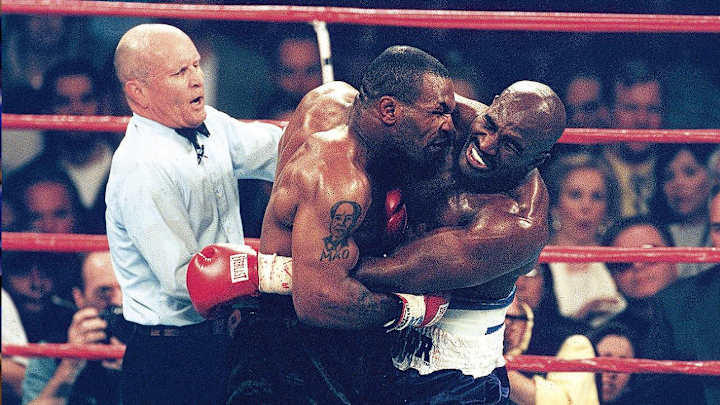
On June 28, 1997, Mike Tyson and EvanderHolyfield fought in Las Vegas in one of the most anticipated rematches in heavyweight boxing history. Holyfield was the defending world champion after he had shocked Tyson seven months earlier in an 11th-round knockout. The two had wildly divergent personalities and were categorically different fighters. Holyfield was a warrior and a strategist; Tyson was a fearsome brawler. The events that followed remain some of the most inexplicable, bizarre and disturbing moments in a sport well-accustomed to pandemonium. For several weeks after Tyson bit off a piece of Holyfield's ear and was disqualified (Tyson actually bit Holyfield twice; he was only penalized after the first bite), the world focused on the controversy. Now 15 years later, questions still remain. What drove Mike Tyson to bite EvanderHolyfield? And, perhaps more importantly: How did "The Bite Fight" affect boxing?
(Note: Holyfield declined numerous requests to be interviewed for this story.)
First, it's important to start with the first Tyson-Holyfield fight.
In the four bouts since his release from prison in March 1995, Tyson knocked out all four opponents he faced in a combined time of 18:40. In the two years before he fought Tyson, Holyfield lost to Michael Moorer in his last title fight, was knocked out by Riddick Bowe, and had most recently struggled in his fifth-round knockout of the aging Bobby Czyz. Tyson had a career record of 45-1; Holyfield had lost two of his last four fights. Holyfield opened as a 25-1 underdog and closed at 15-2. Tyson and Holyfield met for the WBA title in Las Vegas.
Mike Tyson: Before I fought Evander, I had just knocked out Bruce Seldon for the WBC/WBA title after I had just gotten out of jail. I hadn't been out of jail for more than a year. But I was fortunate enough to win a couple of fights and a couple of belts when I came back.
Jimmy Lennon, ring announcer for both fights: The first fight was called "Finally" because this was a fight that was in the making for so many years. This was finally going to happen, but there were a lot of people that were concerned about Holyfield getting hurt. I remember sitting ringside right before the fight and there were some Showtime executives nearby. I overheard them talking not just about the quality of the fight, but they were really seriously concerned about Holyfield's health.
Dino Duva, Holyfield's former promoter: The general public and most of the boxing industry and media thought it would be a massacre for Tyson. There was a feeling that Evander had gotten worse. There were some questions of whether he should even be fighting because there was the incident a couple years ago when he fought Michael Moorer and there were some supposed medical issues after the fight. Evander was rushed to the hospital after that fight and apparently doctors found some issues with his heart.
Don King, promoter for both fights: It was a tough fight to make because of the idiosyncrasies between the two guys. Each had a different perspective on why the fight should or should not be made. The other was saying that they wouldn't fight. There were a lot of ghosts and apparitions that would cause for more negotiations.
Tyson: I knew I wasn't in any kind of condition because I didn't have enough time to get prepared. I really hadn't been active for four years. I was greedy and I wanted the money so I took the fight.
Kevin Iole, former boxing writer at the Las Vegas Review-Journal, now with Yahoo!: It struck me how confident Holyfield was. He was a massive underdog, but he didn't believe anything anybody said. You look back and it's not surprising because that is how Holyfield has always been, but back then at the times it was shocking. Tyson was at his heyday at that point. There were people that feared for Evander's safety, but Evander had placidity and confidence that was amazing. I was tempted to pick him, but I didn't have the courage to.
Marc Ratner, former executive director of the Nevada State Athletic Commission: We took a chance by putting in a referee that the public had not seen. It was not Mills Lane or Richard Steele. It was [the late] Mitch Halpern. Mitch had done about 35 title fights, but the public didn't really know him. This is one of the biggest fights in boxing history and we put a relative unknown in. He did a magnificent job.
Tommy Brooks, Holyfield's former trainer: We had a guy named Gary Bell who was so much like Mike Tyson it was unreal. We kept sending Gary at Evander because when the bell rings [Tyson is] right on top of you. So we had Gary going right at Evander. It the first couple of weeks [of training] it wasn't looking pretty. Holyfield couldn't get in the swing of things. Eventually, he got it.
Teddy Atlas, trainer/ ESPN Friday Night Fights: I think that fight started and ended in the first round. Tyson did what he had done to fighters in the past and hit [Holyfield] late. He did it to make things easier. People that are weak want to make things as easy as possible. [Tyson] doesn't have the capacity to deal with things when they aren't as easy as possible. He pushed the borders by hitting him after the bell. Holyfield took the shot and hit him right back. He didn't have to use words, he told [Tyson] in his behavior and in his posture, that ain't workin' tonight, you're in there with a real man tonight. You're not going to get a free pass tonight. Cheap shots aren't enough; you better be enough, and if you don't have that, you won't be enough.
Atlas: We made (Tyson) into a demigod; we made him into a monster. I always thought that he was a monster as long as you allowed him to act like a monster. When you stood up to a monster it wasn't a monster anymore. We didn't know what Tyson wasn't.
Tyson: I still believe that I could have beaten him. I know that I'm using my conditioning as an excuse, but I still believe that I could have beaten him. I was in jail for four years and he was out fighting for four years. Regardless of losing or not, he was fighting, he was sharp. He never got stale.
Atlas: The greatest talent of Tyson was not his left or his right, it was his ability to look, hold on, embrace and take advantage of somebody else's weakness. When your best talent is thriving on weakness to be strong, you have a problem. By the end, he was a game quitter: a guy that doesn't allow himself to fall down, but not to fight back. He takes punishment but with the hope of getting out of there. That's a game quitter. He can't overrun him with power, he can't intimidate him. Now he's got a real situation on his hands.
Tyson: He was butting me a lot that night, and I [momentarily] blacked out a lot in the first fight. At that point, I really can't defend myself. I was taking a tremendous amount of heavy arm punches because I don't know where the hell I am at. He's not hurting me because I can hear the punches, but I can't get myself together. He had me off-balance. Boom! Boom! Boom! Then I'd reset, Pow! Pow! Pow! He rings my bell again. Boom! My bell is rung.
King: Everybody was shocked. It was a shock to the world when he came out and beat Tyson. He knew how to use every part of his body. He was a magician like Siegfried and Roy. Now you see me and now you don't. He was fearless. It was an amazing thing.
Tyson: I went 11 rounds and took a beating with a 3 1/2-, 4-year layoff. Imagine if he fought me that type of layoff and I was at the top of my game. That's what happened with the great Larry Holmes when he tried that with me, right? That's what happens when you go up against a champion and you are not prepared. If you don't put the work in for a consistent amount of time, you are not going to perform with the same magnitude that you once did.
Dubbed "The Sound and the Fury", the rematch was arguably the biggest heavyweight title fight of the decade. Don King spiced up the weigh-in with a memorable introduction, celebrities poured in to the MGM Grand by the dozens and scalpers sold tickets for as much as $12,000 apiece. The world focused on this fight. Nobody could envision its ultimately shocking conclusion.
Jim Gray, Showtime ringside reporter: When Tyson first lost to Buster Douglas, people said he lost because he was out of shape, because he was in Tokyo, because it was a throwaway fight, and that the count was bad. There were 40 issues from that fight. So everybody kind of blew off the Douglas fight. Nobody expected that Tyson would lose to Holyfield. So when he lost to Holyfield, the rematch was being built up back in the days of the Ali fights. It had commanded that kind of attention.
King: Going into the first fight, they were two gladiators going into the center of the ring with a mutual respect. The second time, there wasn't any. It was total acrimony. Tyson now is lean and mean. That fight had a lot of activity and back and forth with the acrimony and vilification that was taking place. It was a tough scuffle to keep them from fighting before they got in the ring.
Ratner: The commission thought that Mitch [Halpern] did a real good job so we put him in the second fight. Well, once we announced that Mitch was going to be the ref again, the Tyson camp vociferously complained and wanted a different ref. They had an emergency meeting of the athletic commission and there was no reason to take Mitch out. The commission decided to keep Mitch in.
Steve Albert, Showtime play-by-play announcer for both fights: Tyson had his issues with Mitch as a result of what happened in the first fight because Tyson thought that he was repeatedly fouled with Holyfield's head-butting and holding. That probably wasn't far from the truth.
Bobby Czyz, former Light Heavyweight and Cruiserweight Champion/ Showtime color commentator: [Holyfield] did it regularly. He did it in the first fight. He did it against me. He elbowed me and butted me. It's part of his way. He comes in and does it slick. We know the game. Evander Holyfield uses his elbows, forearms and whatever he need to do to win.
King: Tyson complained that Evander had three arms. He said Evander could use his head better than anybody in the business. [Tyson] felt he could use it as a third fist or third arm. That's what his complaint was to me so we expressed that to everybody, and wanted to get back together again so that would be curtailed. It would be more of a level playing field because Holyfield had magnificent structure in his body, always well-conditioned, and he had awesome power of control on his body that he could move himself from harm's way. That was the biggest obstacle going on at that time.
Ratner: Mitch to his credit didn't want to be the focal point of this fight and turned it down. That is how Mills Lane became the ref. Lane was a real character in his own way, a law and order type referee, a judge in real life. If Tyson didn't want Mitch, [Holyfield's] camp certainly didn't want Mills Lane. They wanted Richard Steele. But Mills got the assignment.
Atlas: The day of the fight, [late New York Daily News boxing writer] Jack Newfield was having his garden party. All these people that like to pool their head around boxing. It was getting closer to the fight. I said I don't want to stay, Jack. I don't want to watch this guy. I'll watch it privately at home. I don't want to talk to anybody about this guy. Jack asks "Teddy what do you think is gonna happen?" I said "I think Tyson is going to find a way to get disqualified."
Ratner: I remember walking into the MGM that day. I could barely get through the crowd, and this wasn't even a crowd going to the fight! They were just hanging around. They were there for whatever reasons. It was an uneasy feeling of this crowd of people not getting in.
Iole: The atmosphere was really charged. It was electric.
Don Turner, Holyfield's former trainer: We trained the same way because we knew that Tyson wasn't going to change because he had the same people in the corner. He only knew one way.
Classic Photos of Evander Holyfield
Evander Holyfield and Pablo Romero

Evander Holyfield and Dwight Muhammad Qawi

Pernell Whitaker, Evander Holyfield, Tyrell Biggs, Mark Breland and Meldrick Taylor
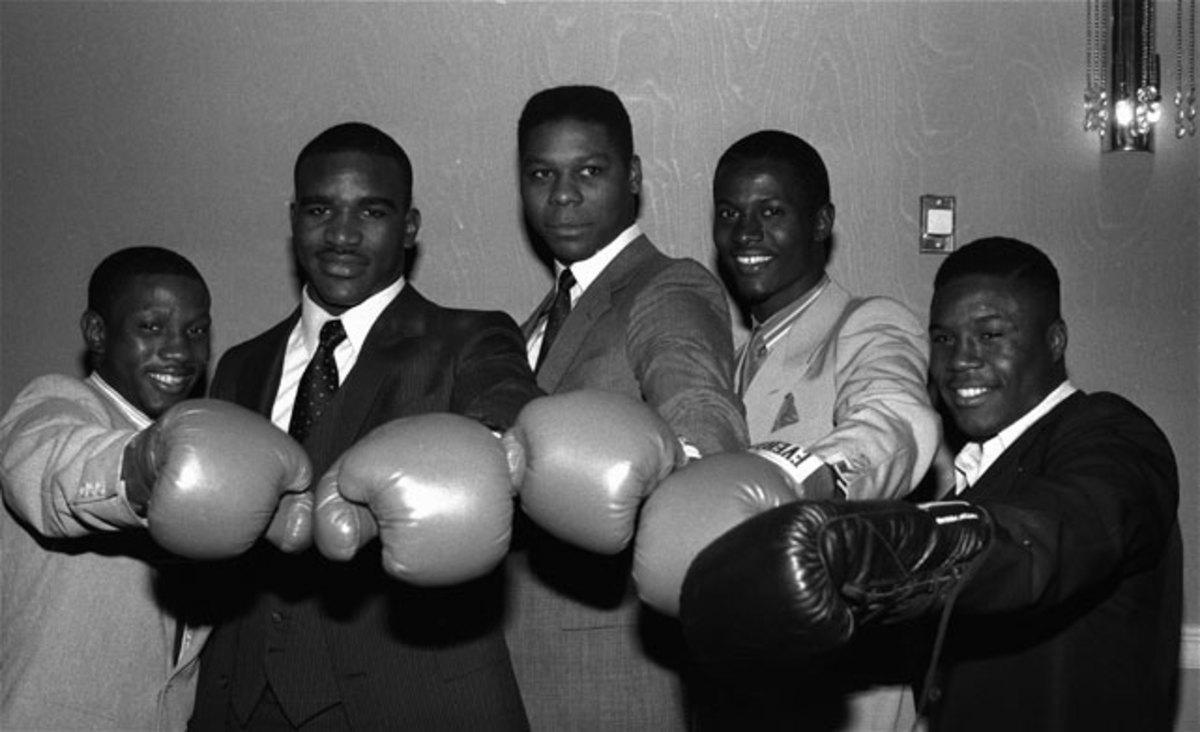
Evander Holyfield
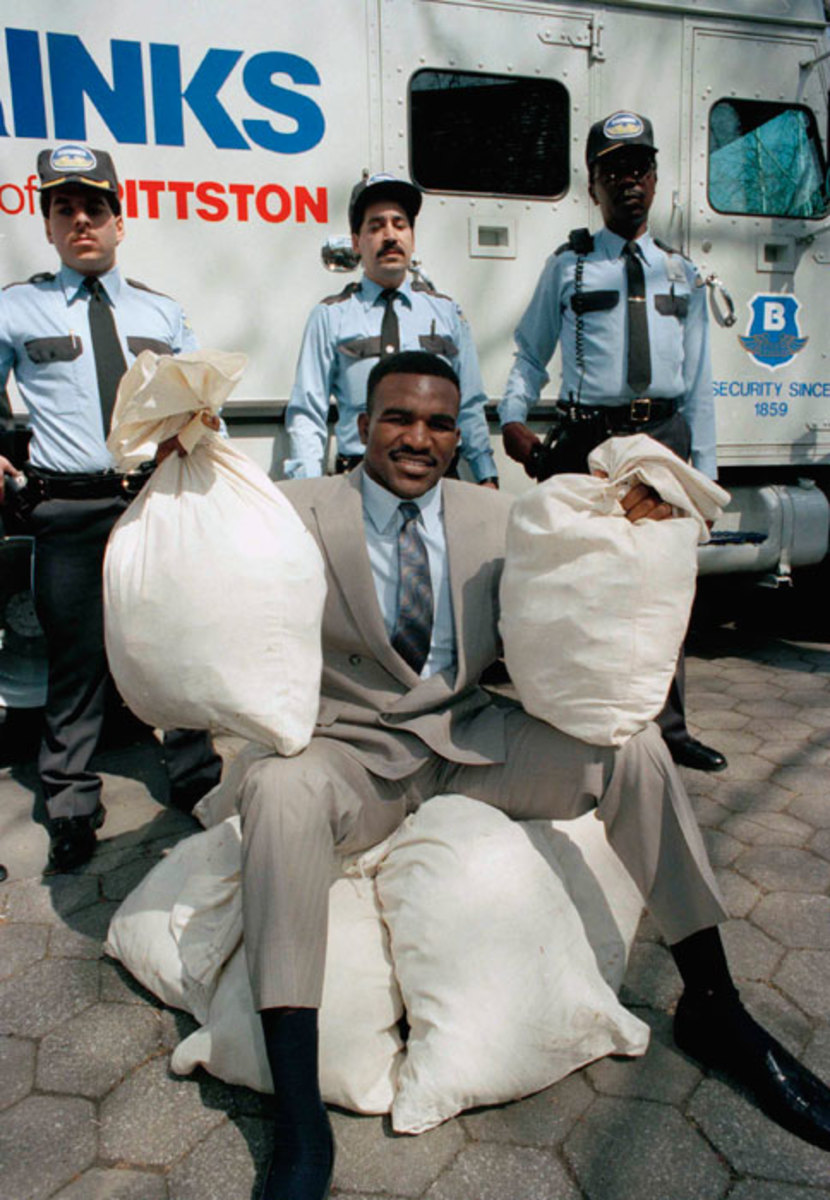
Evander, Ewin and Evander Jr. Holyfield
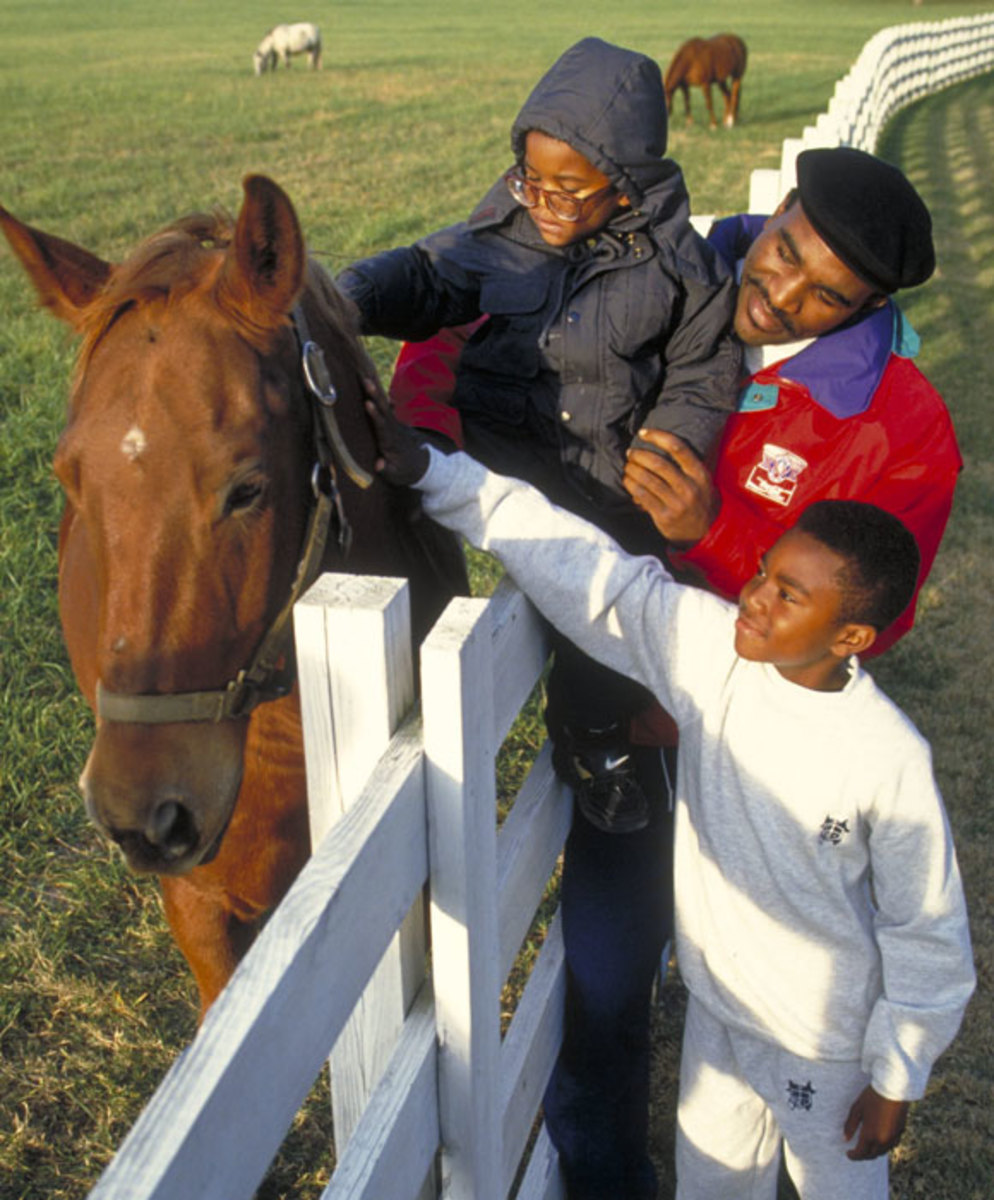
Evander Holyfield and Ray Mercer
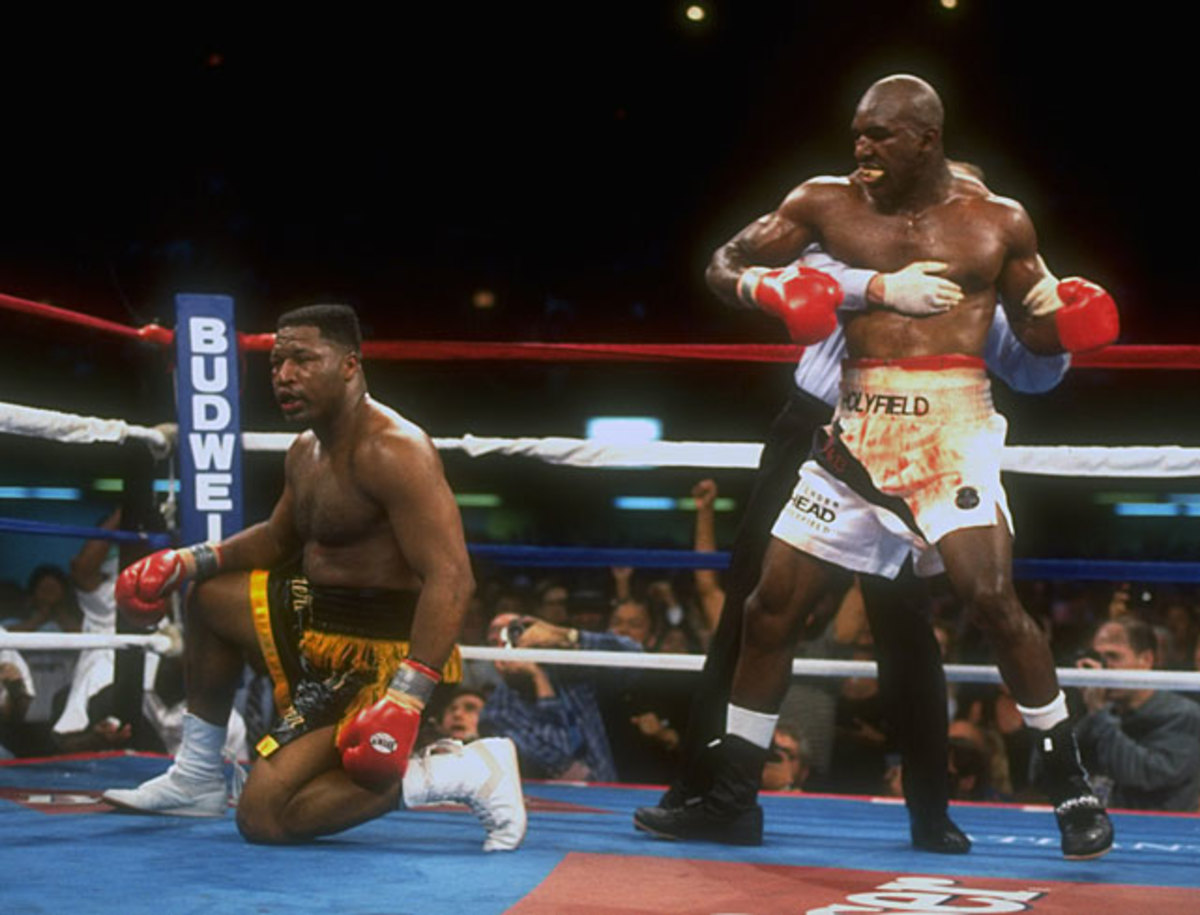
Evander Holyfield

Evander and Ewin Holyfield
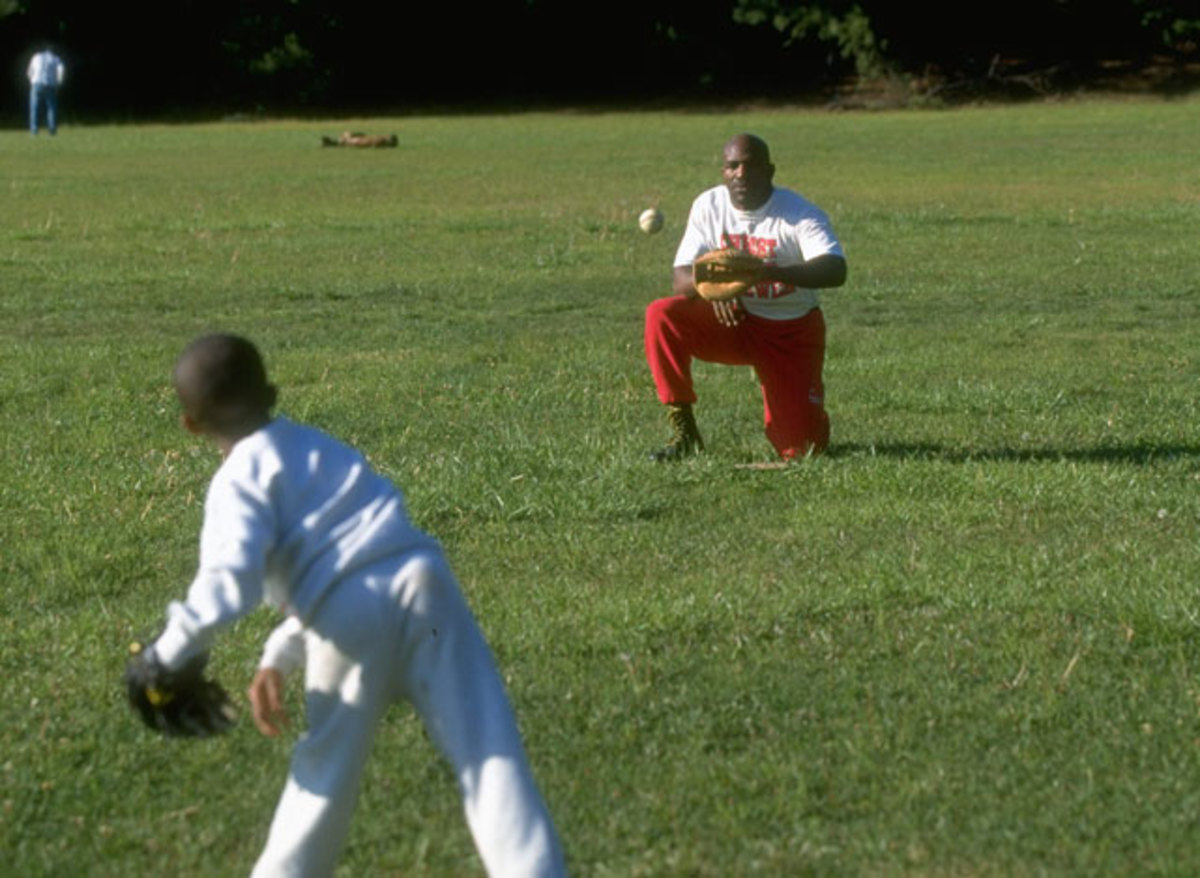
Evander Holyfield and Mike Tyson
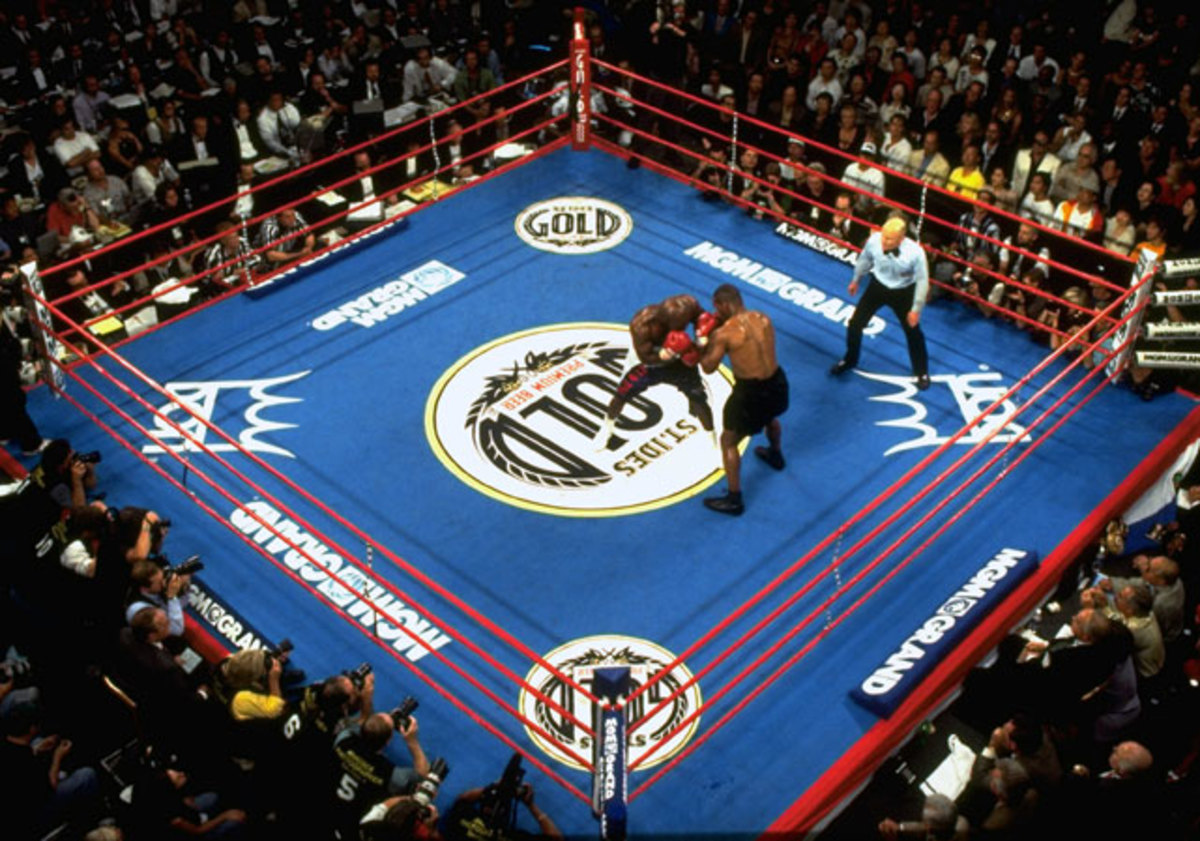
Mike Tyson and Evander Holyfield
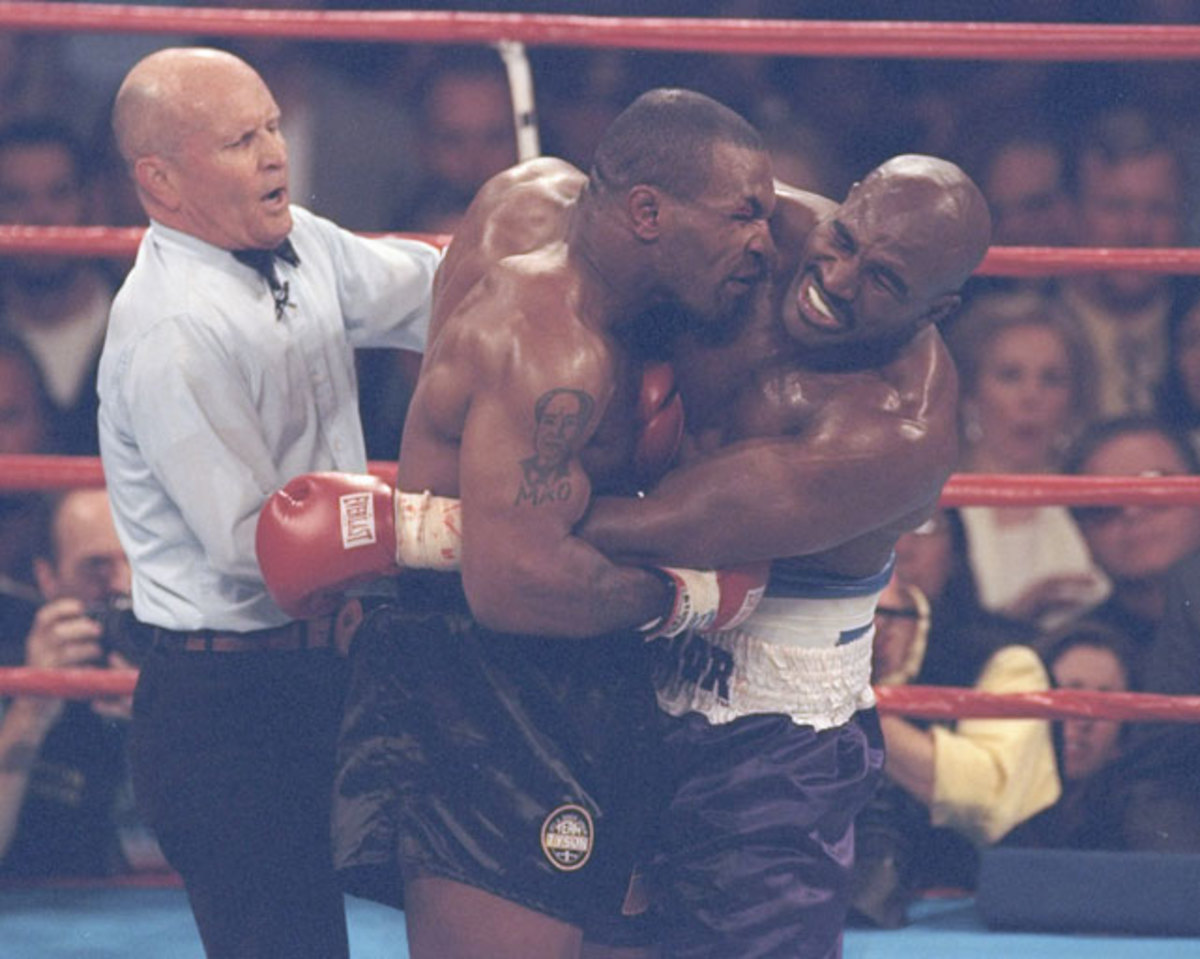
Evander Holyfield

Muhammad Ali and Evander Holyfield

Evander and Evette Holyfield
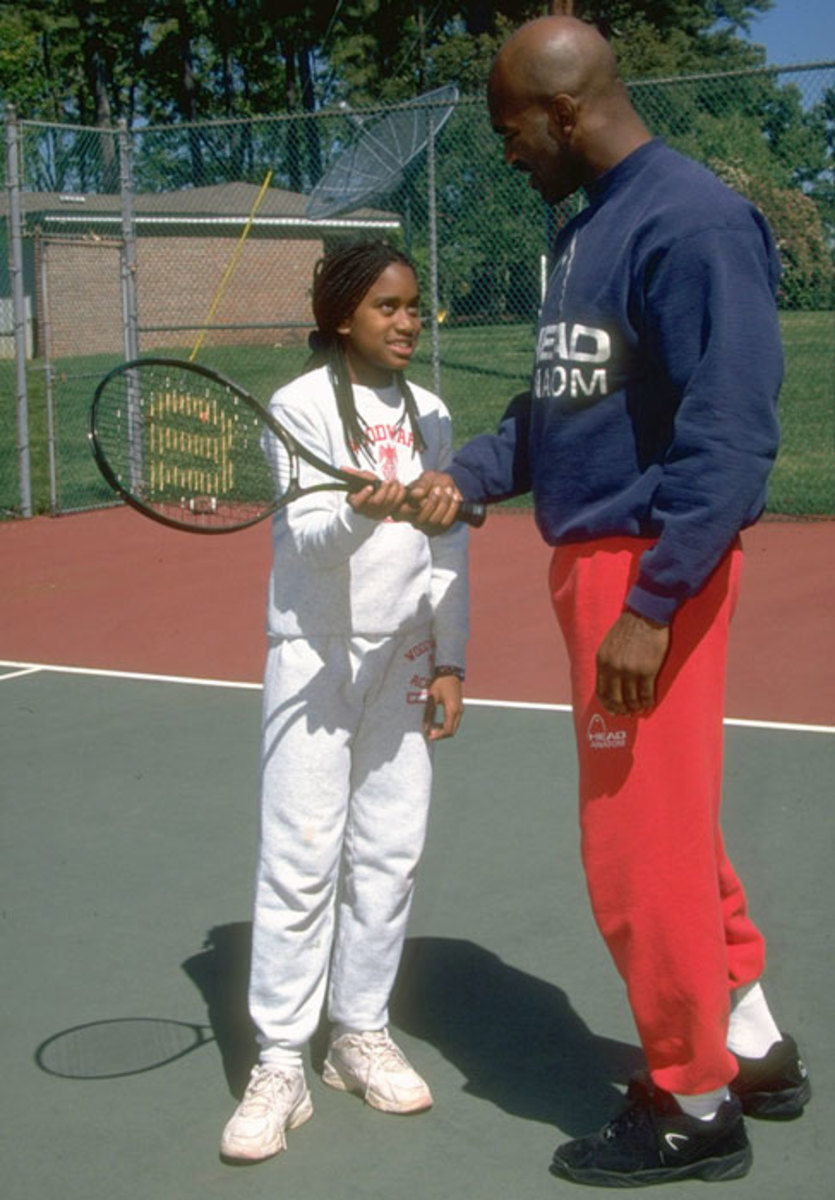
Evander, Janice and Eden Holyfield
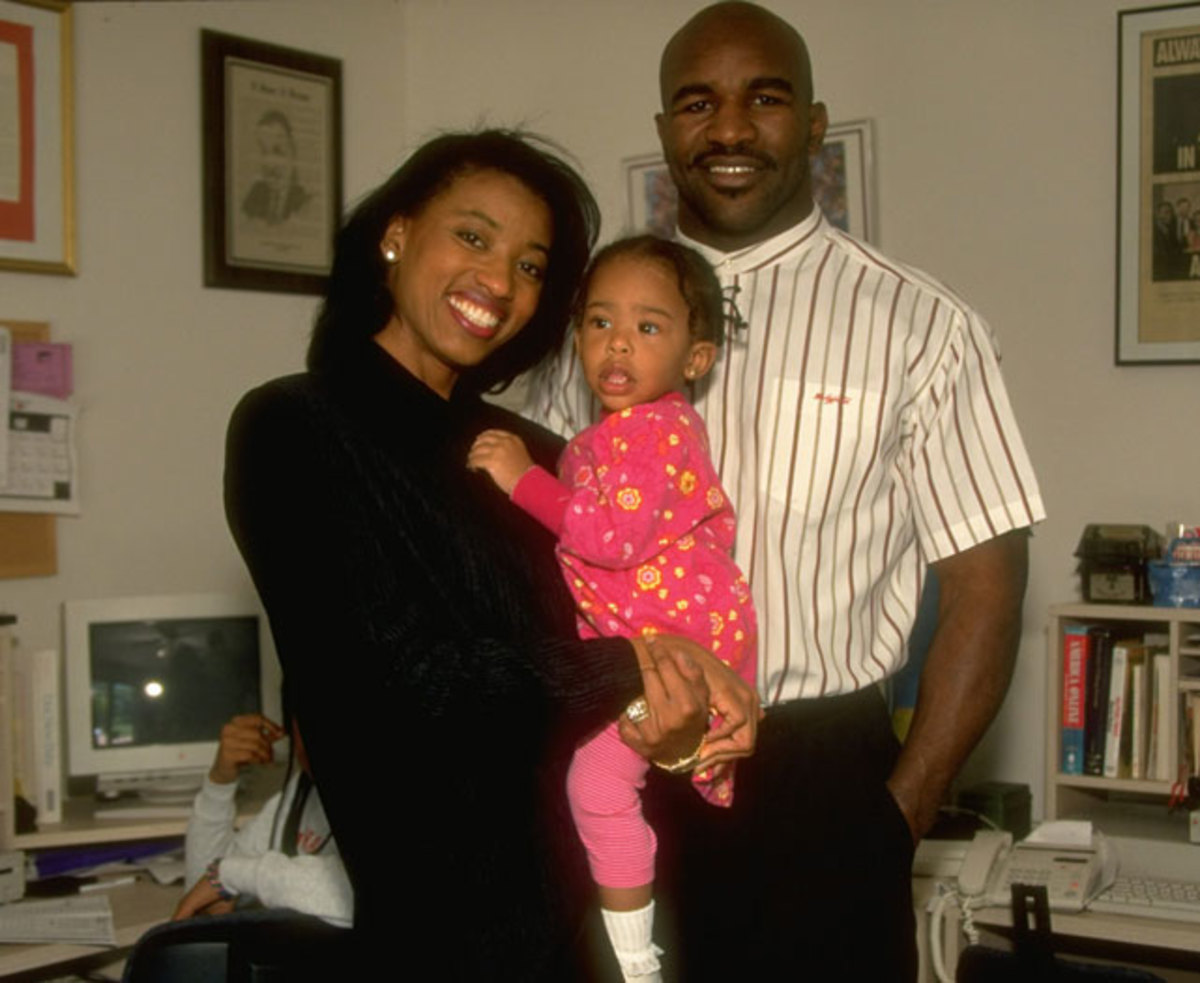
Evander Holyfield
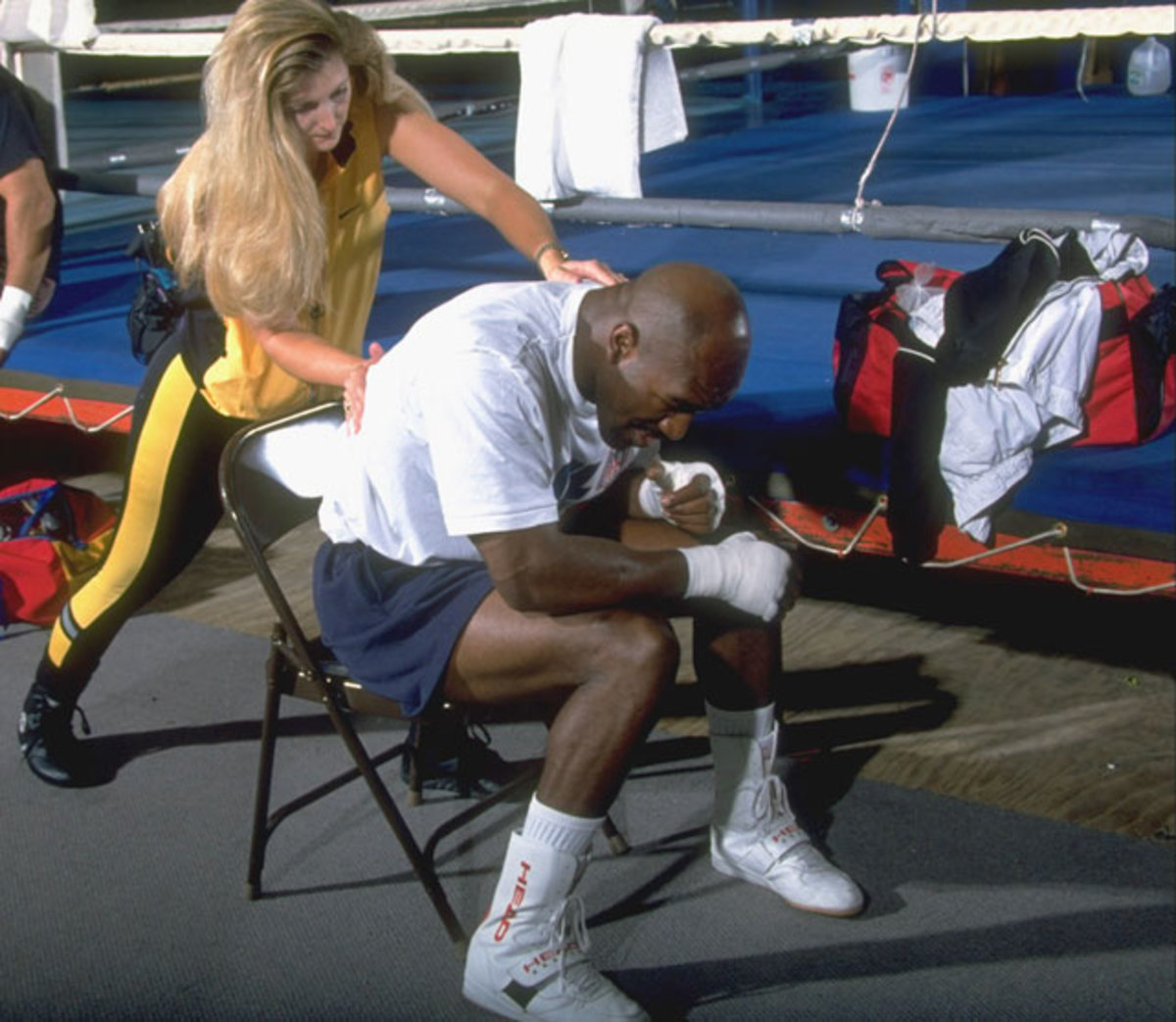
Evander Holyfield

Evander Holyfield and Lennox Lewis
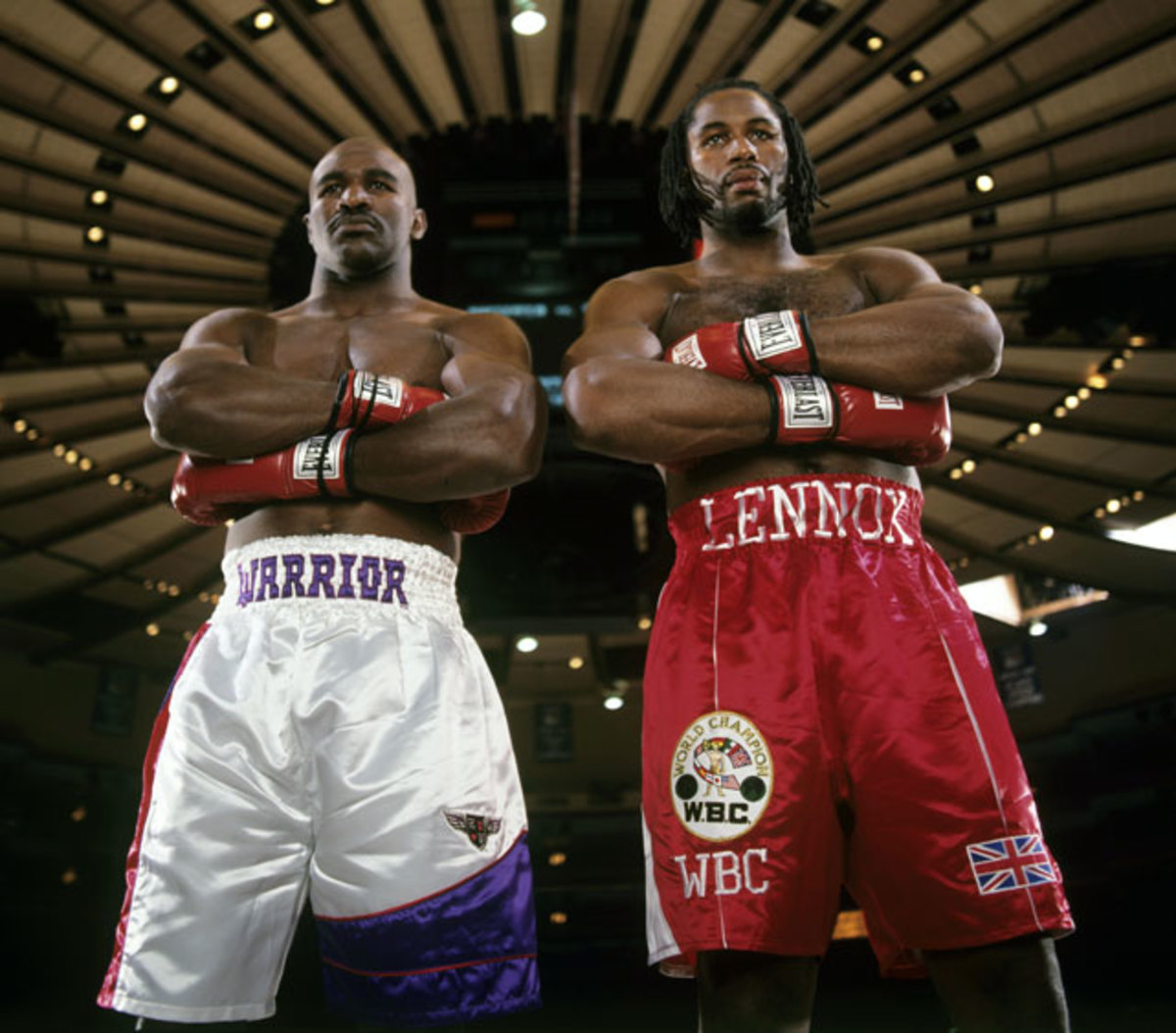
Evander Holyfield

Nikolai Valuev and Evander Holyfield
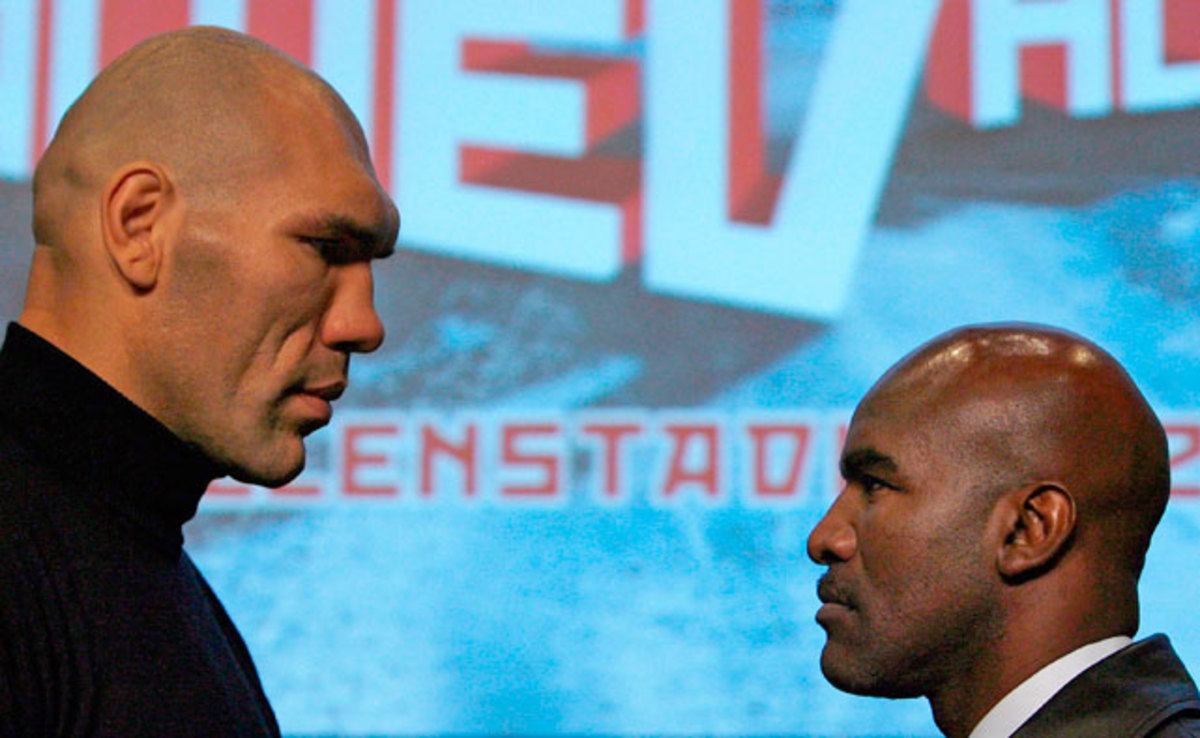
Yoko Ono and Evander Holyfield
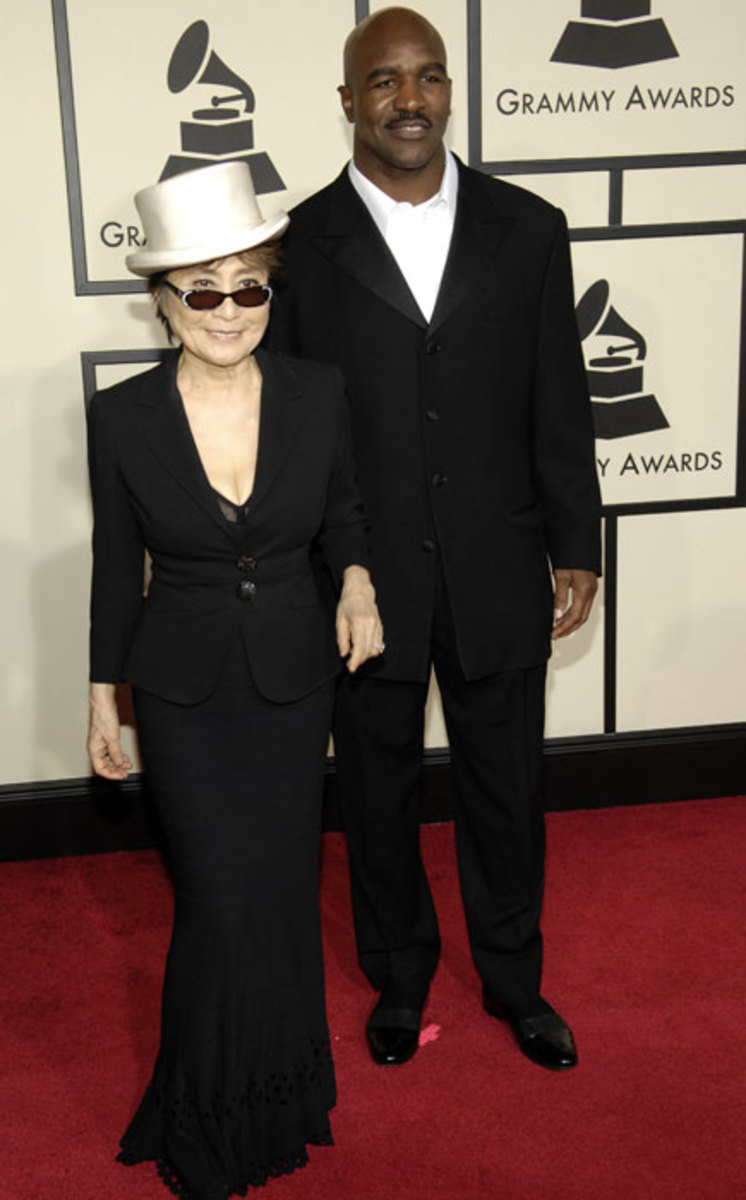
Evander Holyfield

Tyson: I prepared extremely hard for the second fight. He was butting me, but he did it so magnificently in the first fight that I didn't realize it.
Chuck Giampa, judge for the second fight: I always tried to capture that moment, especially when Mills Lane did a fight, when all the hoopla is down. Mills would clear the ring and it's just the two fighters. It's the moment of truth.
Iole: The first round started off very similarly to the first fight. In the second round, Tyson did better. It was a much better round. You had a sense that he went to a corner in the second round and it appeared to be a fight.
Czyz: There were some flashes of brilliance by both. To this day, I wish that bite never happened. I wanted to see it go. I was excited about it. I assumed that Evander came ready to fight like he did the first time. That wasn't going to change. But I thought that the second time that Mike would be prepared. This time Mike knew what to expect. He trained and he knew this was not going to be a 3-4 round blowout. So I was of the mindset that this should be a good long fight.
Lennon: It was a really dirty and rough fight. There was everything from Round 1 on. There were head-butts, low blows, a lot of grabbing and wrestling, pushing and shoving. It was just a rough fight. But in the fight itself you could see that Holyfield was picking up from where he left off in his last fight and Tyson was getting more and more frustrated.
Don Stradley, longtime contributor for The Ring: At the time [Tyson] was talking about the butts, but nobody wanted to hear it. As some years went by and everybody started noticing that Holyfield does use his head, they started looking back at that fight and realizing that maybe there was some head-butting going on.
Czyz: Winning is what you need to do at all costs. And then after the fight [Holyfield] praises God so he looks like a great guy even if he forearmed and head-butted you in the eye. You look at the fight and watch some of the clips, he gets inside, he gets his head down and he does head-butt, he does elbow, he does use his forearm, he does use the inside of the gloves and use his face. He uses everything he has, and against Mike Tyson, I probably would too.
Rich Giachetti, Tyson's trainer for the second fight:[Mike] knocked out two different sparring partners in Florida when he didn't even mean to. He was in such good shape that when he hit the guys he'd do everything right and he'd knock these guys out. We were ready. Suddenly he gets butted and cut his eye in the first round. A cut heals from the inside out, so it wasn't healed up.
Gray: His eye was bleeding really badly. He had suffered a terrible, terrible head-butt. I didn't think of [the bite] at the time as being retribution. I kept thinking that this fight can't go on long; perhaps he is going to do something to disable Holyfield because he's not going to be able to continue.
Lennon: It was clear that Tyson was getting beat and Holyfield was not going to be bullied in this fight. There was a lot of frustration on Tyson's part. You could see he felt he wasn't getting justice. He was complaining to the referee about getting head-butts and low blows. The ref didn't see the low blows and a lot of people didn't see the low blows. And then the head-butts, Mills Lane ruled it an unintentional head-butt and correctly so, but Tyson wanted more. He didn't like how this fight was unfolding.
Tyson: I prepared extremely hard for the second fight. I realized in the first and second rounds of that fight I was blacking out and feeling dizzy like I was in the first fight. After that first fight, I said I am going to get in the best shape of my life. And then it was happening again. I started freaking out. I wasn't getting any help from the referee. (Holyfield) must have butted me 15 times.
Iole: I see them fighting inside and their heads are against each other. That isn't unusual, sometimes guys fight inside. Suddenly, I see Holyfield jumping up and down. I thought Tyson might have hit him low.
Lennon: When Holyfield leapt up into the air, that struck me. I'll never forget that image. Fighters want to keep their feet on the ground at all times, and suddenly Holyfield is jumping up in the air? I had no clue what happened.
Gray: Well, I saw the first ear bite and I couldn't believe it. I thought about that for a second. He bit his ear. Holyfield reacted, and then Mills Lane reacted. Tyson kind of lifted his arms as if to say "Who? Me? What?"
Brooks: When he came back to the corner, I saw blood running down the side of his head and thought "what the heck?" Evander was saying "He bit me, man! He bit me!"
Ratner: Mills came over and said he bit him and that he was going to disqualify him. As an aside, I was an NCAA football official. When you want to eject somebody, the ref will always ask "are you sure you want to do this?" He'll give you a second to think about it to make sure you don't get caught up in the heat of the moment. That was the first thing that came to my mind when Mills said he wanted to DQ him. I asked "are you sure you want to do this? You want to disqualify him?" And then he said, let's get Dr. Homansky to take a look. Dr. Homansky said that he was OK to go.
Giampa: My seat happened to be closest to Holyfield's corner. I remember his trainers going crazy saying "he bit him!" Holyfield immediately blocked out everything and I saw him just moving his lips like he was meditating or praying. He got back in the zone. He was ready to get back into the fight.
Ratner: What I wonder to this day is that if Tyson somehow would have knocked Holyfield out, not only would have the course of boxing history have been changed, but the course of my life. I would have been the one that would have said in essence to not disqualify him.
Atlas: I remember yelling to my wife "He's gonna bite him!" "He's gonna DQ himself!" you see Holyfield jumping. "He bit him!" Who would have thought that was it? Nobody could comprehend that he just bit his ear off? You could guess but you can't guess that. He's getting out of the fight. A little while later it's clear. For me, that's it. That's how you put it together. That's the puzzle.
Tyson: I was desperate at that particular moment. I was desperate. I was blacking out. I didn't know what to do.
King: You have to understand the frustration of Tyson. Tyson said he was being butted and he couldn't appeal to anybody to get any type of help so he took it upon himself to bite the man. On Holyfield's part, it's a normal thing of going on with his business. Maybe he doesn't even realize that he's doing what he is doing whatever it is. He's out to win. He's in it to win it and you can't quit. You have to be able to go with what he has to offer. Nobody really knows if it was by calculation and design. Only Holyfield knows that. With Tyson, it was frustration and exasperation that exploded. It came to that one drop of water that makes the cup overflow.
Giachetti: He lost it because he thought he was going to lose again. He felt like he was going to lose his pride and everything. Rage is all he had in him. It was a tragedy. I never expected anything like that.
Lennon: Here's how I remember that there was a second bite. I remember distinctly that the round ended and his trainer Don Turner stepped through the ropes and very calmly walked across the ring and taped Mills Lane on the back. I assume he said that he bit him again. Lane didn't see it either. Turner brought Lane over, observed the second bite on the other ear and then the fight was called at that point.
Gray: You could never think that there would be anything more outrageous that would occur with until this. I never considered myself as one who would someday interview Jeffrey Dahmer.
Iole: There were the angry Tyson fans, they lost control of their emotions because Mike lost control of his emotions. It was dangerous in the crowd. Holyfield's fans were jeering. Fights were breaking out throughout the stands and fans were throwing things toward the ring. It was really bad. It was a scary time.
Nigel Collins, ESPN Friday Night Fights/Former editor at The Ring: I think what I remember most, what stands out for me more than anything else, was when Tyson left the ring he was walking back to the dressing room -- you have to go through a corridor where the bleachers are. As he was walking in that area, fans were leaning over and throwing drinks at him and other objects. Tyson was enraged and actually tried to climb up the side of the bleachers to get to the fan and had to be pulled down by some of his men. That was an indication of how far off of the rails that it got.
Tyson: I was doing my prima donna s---. F you and this and that and F you this is about my children. F you I want to fight you again.
Rare Photos of Mike Tyson
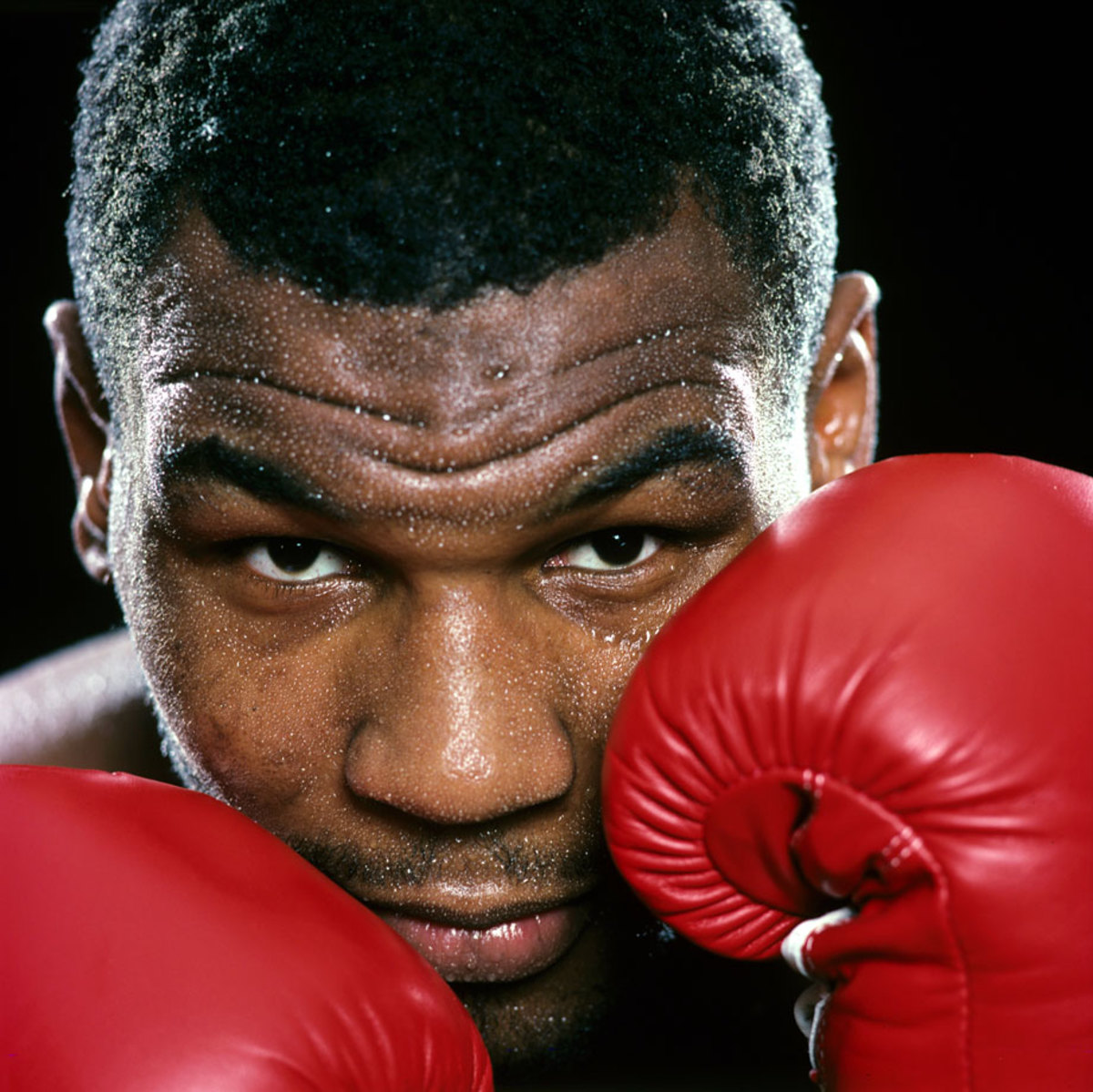
Arguably one of the hardest hitting boxers in history, former heavyweight champion Mike Tyson successfully defended the championship title nine times, finishing his career 50-6 with 44 wins by knockout.
1984
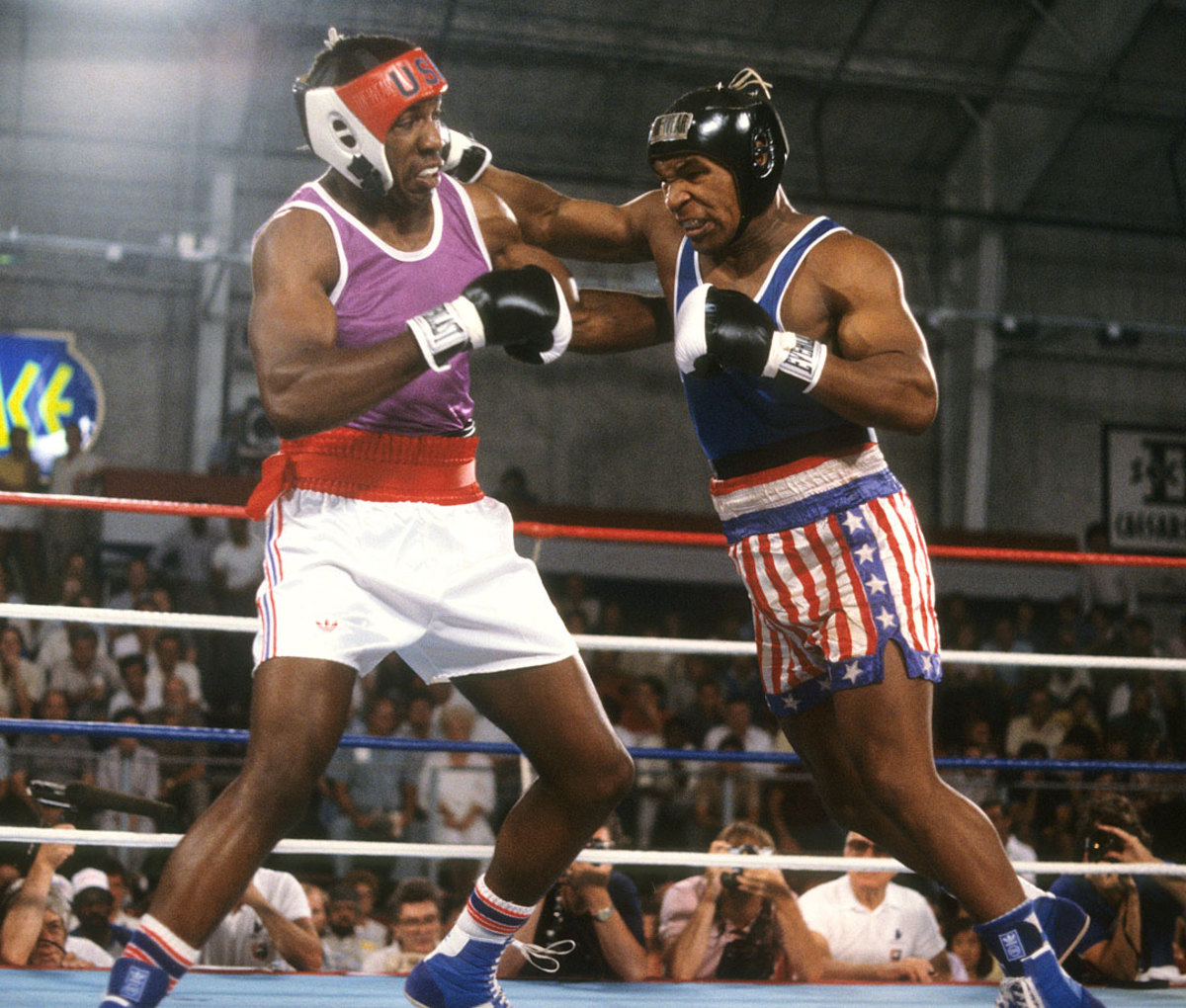
Mike Tyson lands a blow to Henry Tillman during their Heavyweight bout at the U.S. Olympic Trials held at the Sports Pavilion of Caesars Palace in Las Vegas.
1985
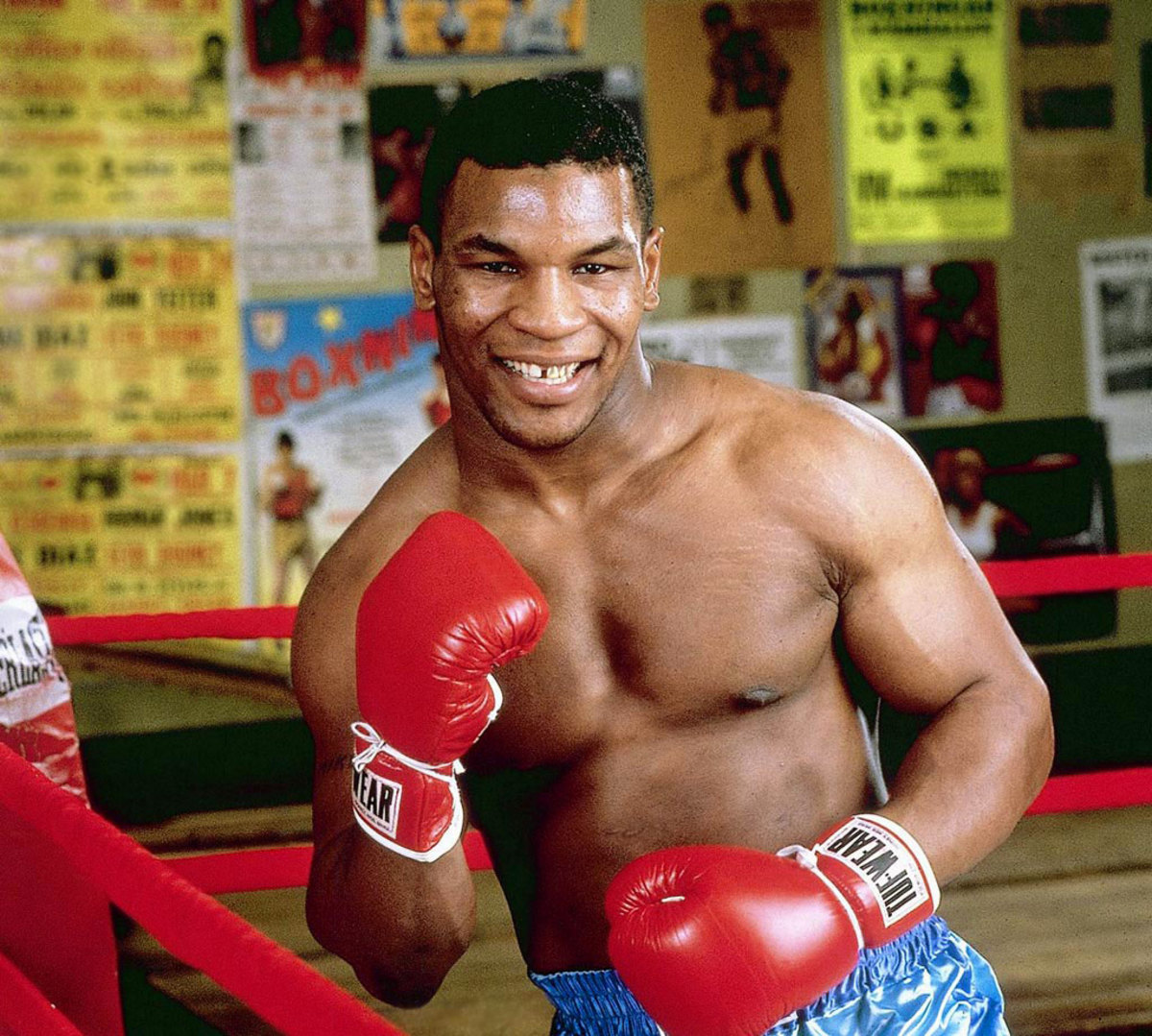
Mike Tyson poses during a photo shoot for his first SI cover.
1985
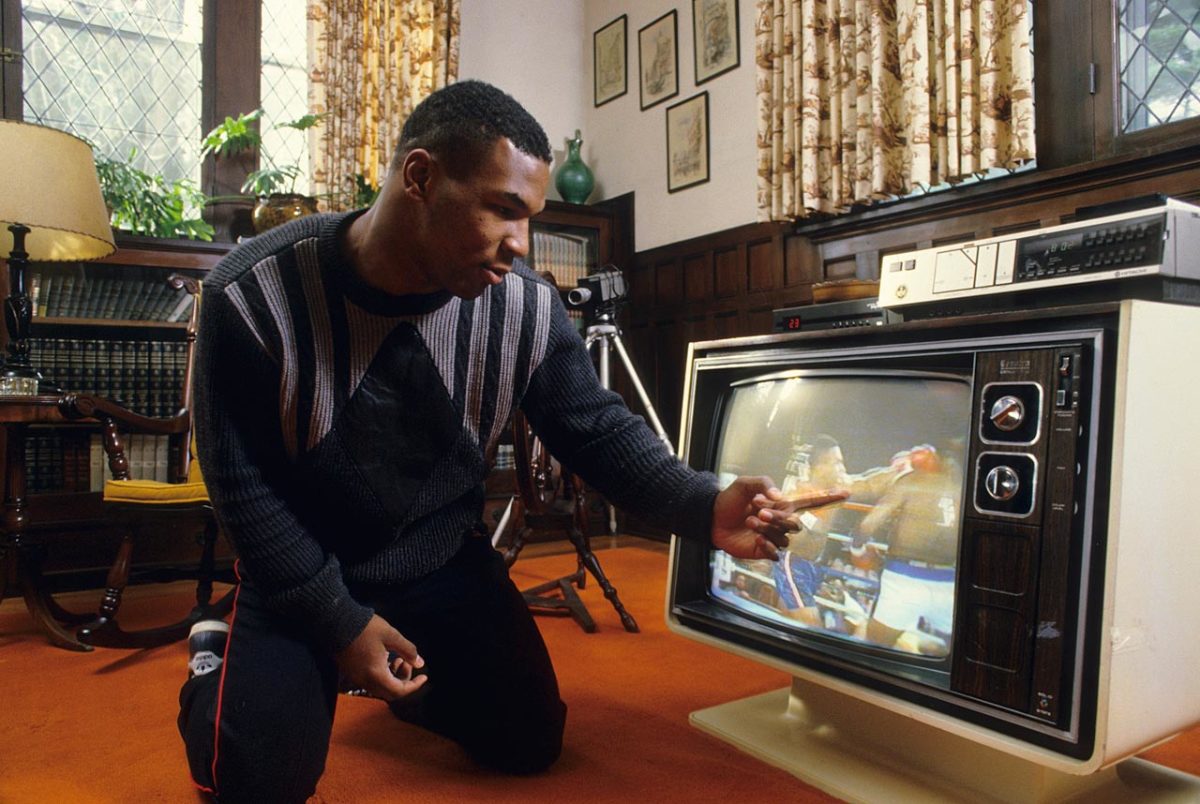
Mike Tyson watches video of a fight at the home of his surrogate mother Camille Ewald.
1985
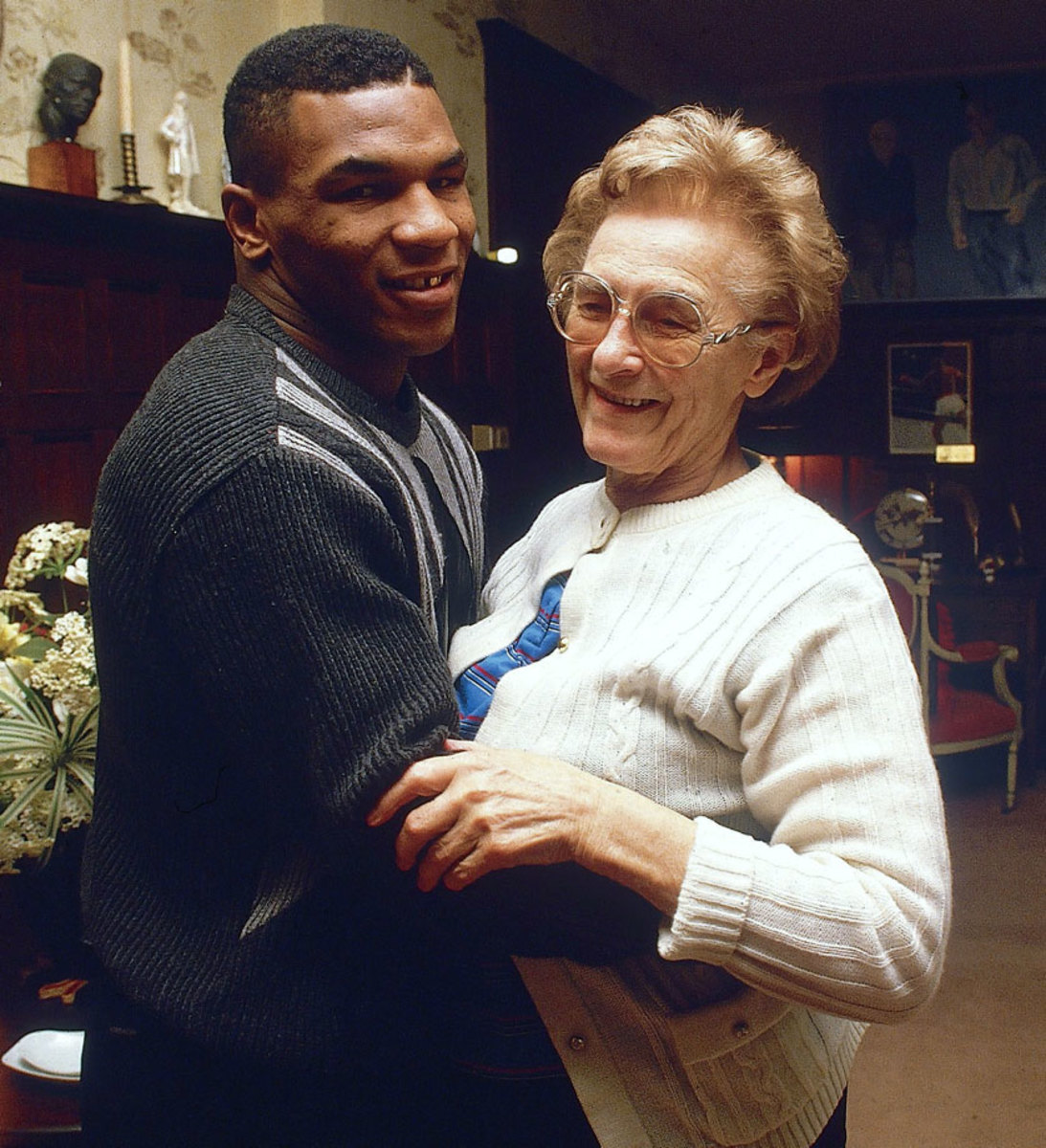
Camille Ewald instilled a lot of family values in Mike Tyson.
1985
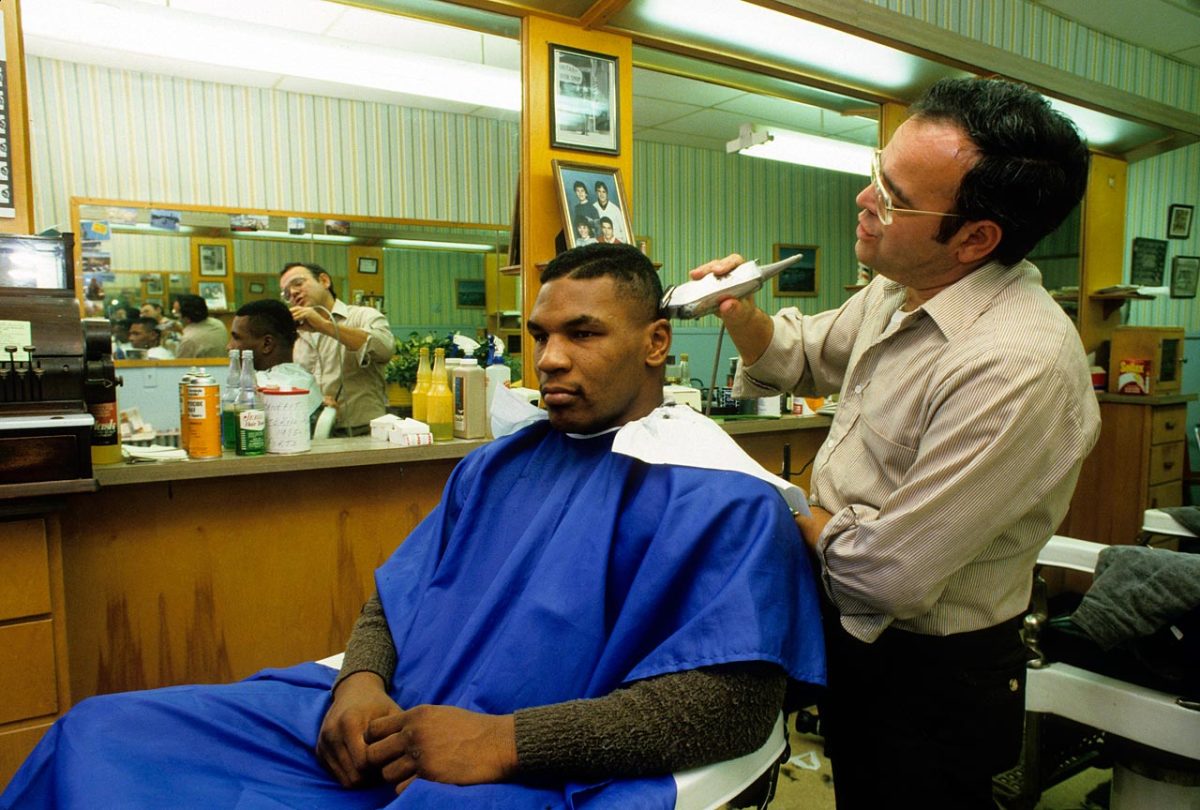
The Sanitary Barber Shop in Catskill, N.Y., was one of Mike Tyson's regular visits.
1985
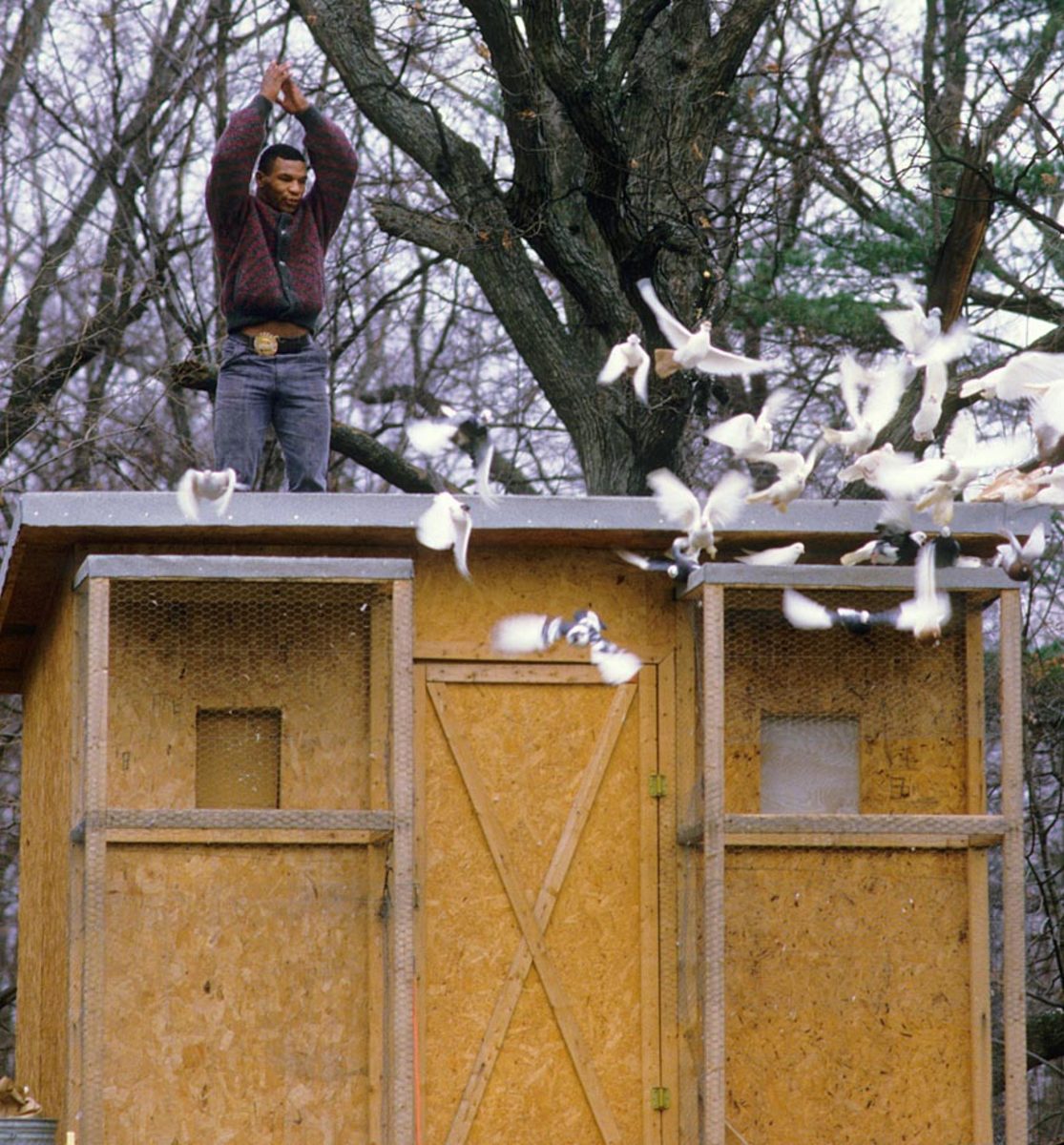
Mike Tyson poses outside of his pigeons coop in Catskill, N.Y.
1985
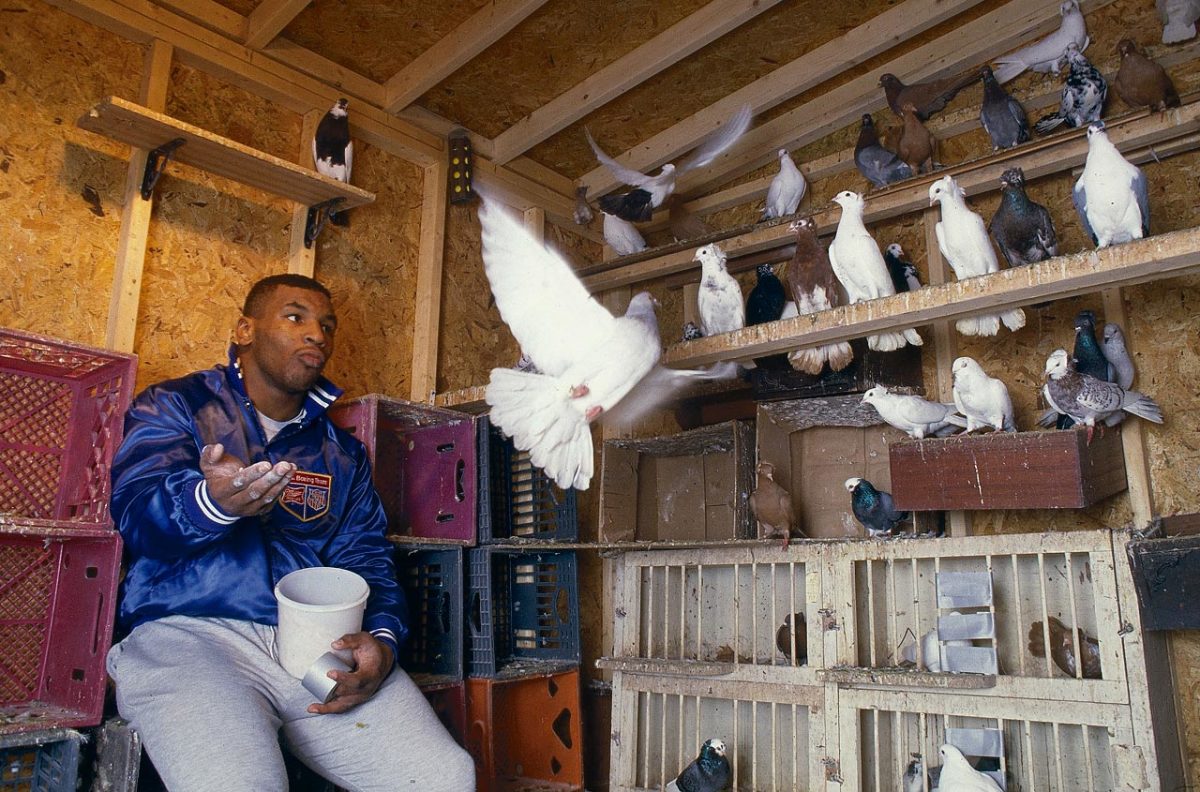
Mike Tyson spends some quality time with his pigeons.
1985
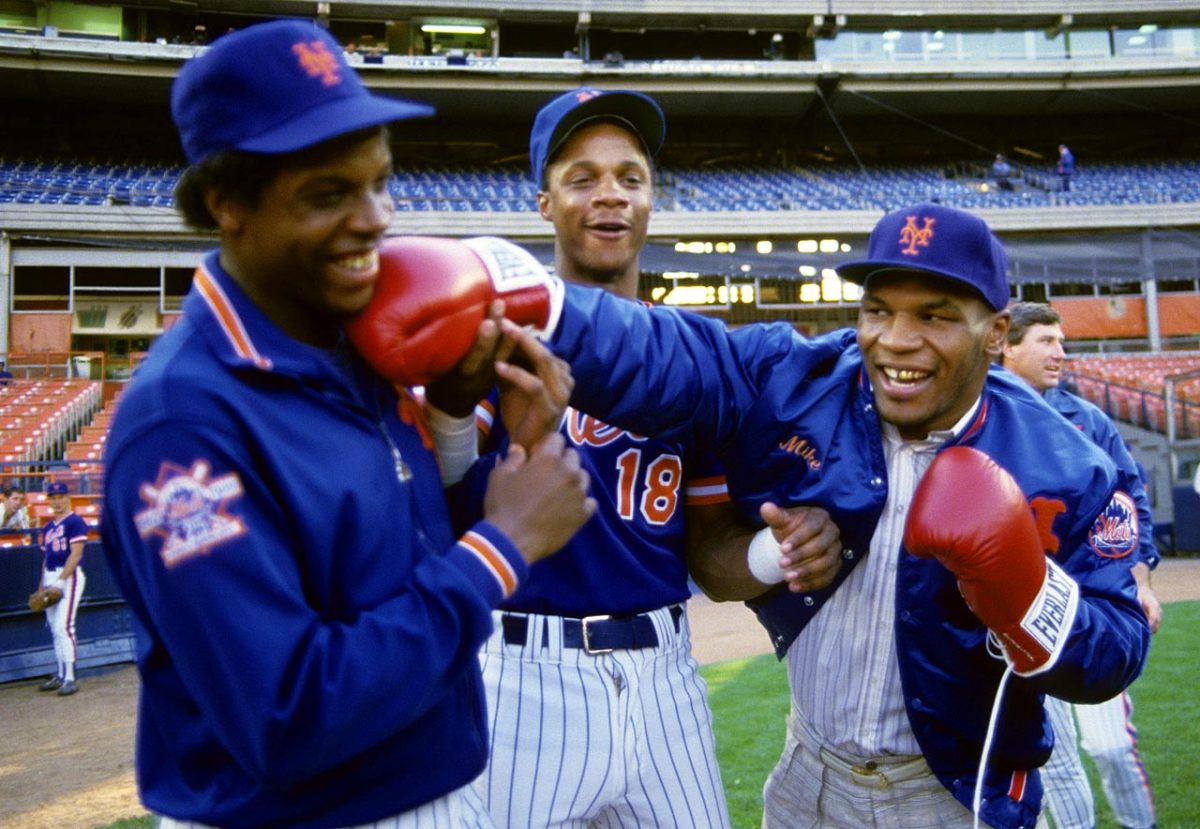
Mike Tyson throws a mock punch at New York Mets pitcher Dwight 'Doc' Gooden as Darryl Strawberry looks on.
1986
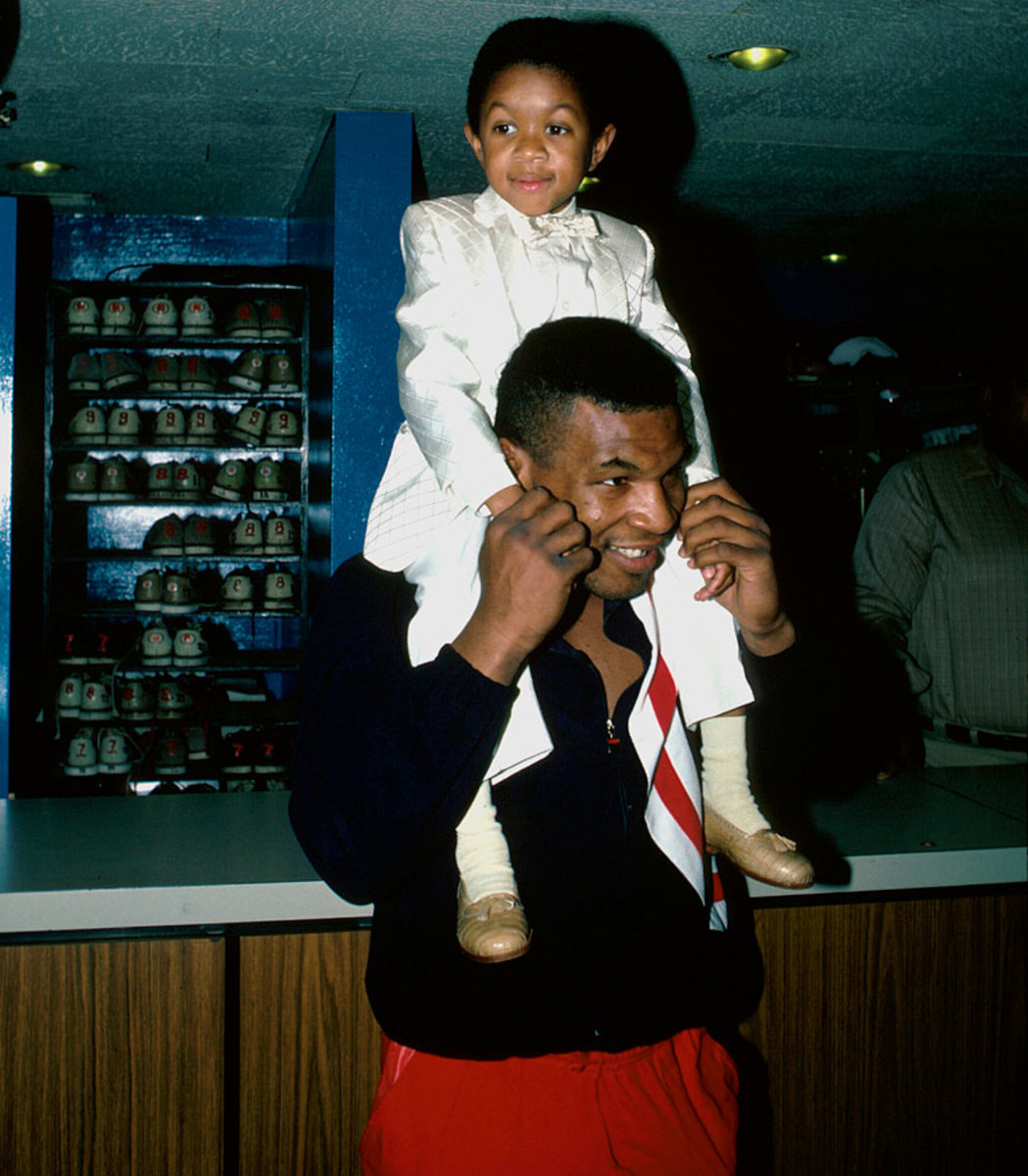
Actor Emmanuel Lewis is escorted around a bowling alley by Mike Tyson.
1986
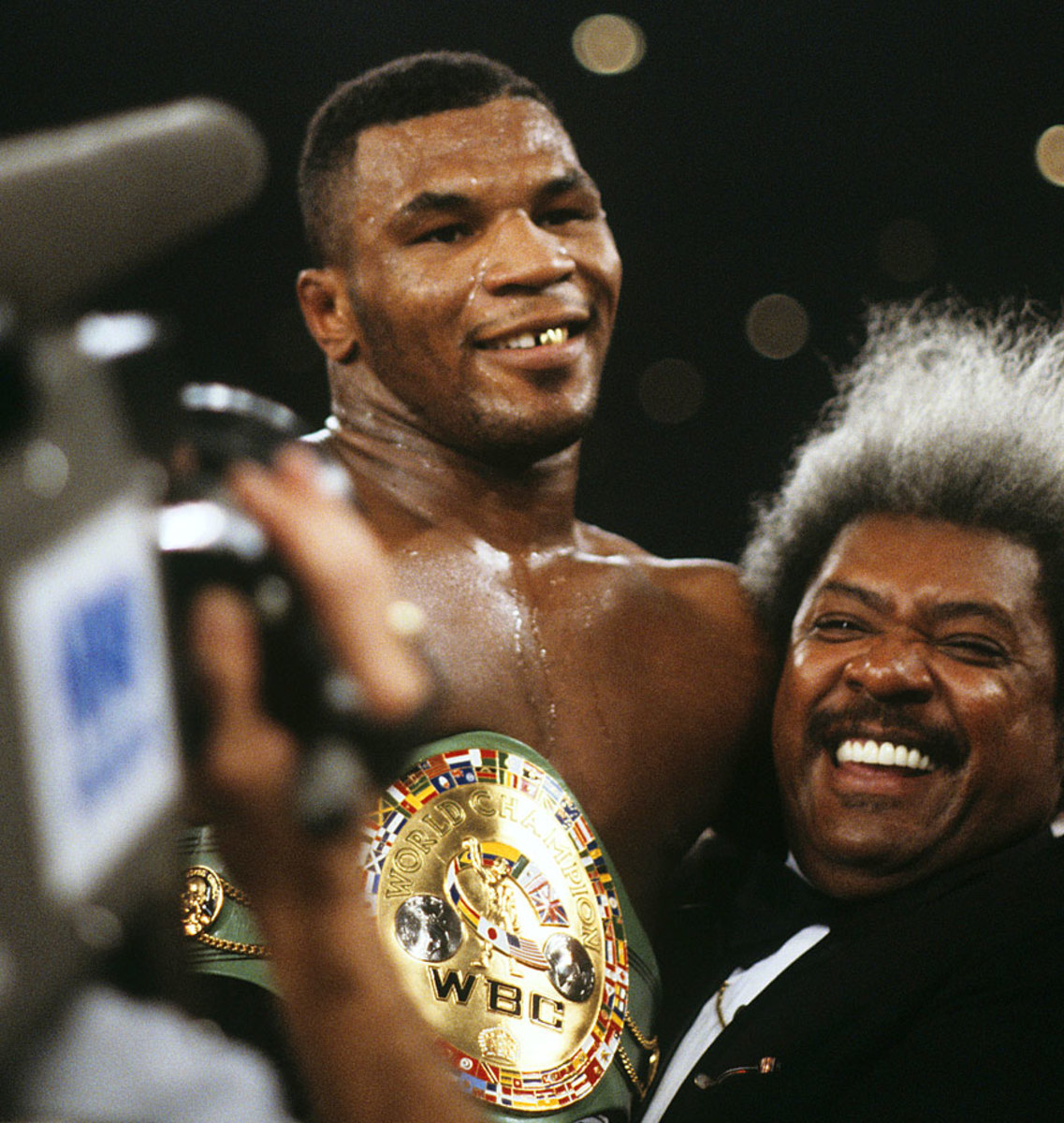
Mike Tyson was all smiles after winning the WBC title with a second round TKO of Trevor Berbick. Longtime promoter Don King and Tyson were once a winning combination.
1986
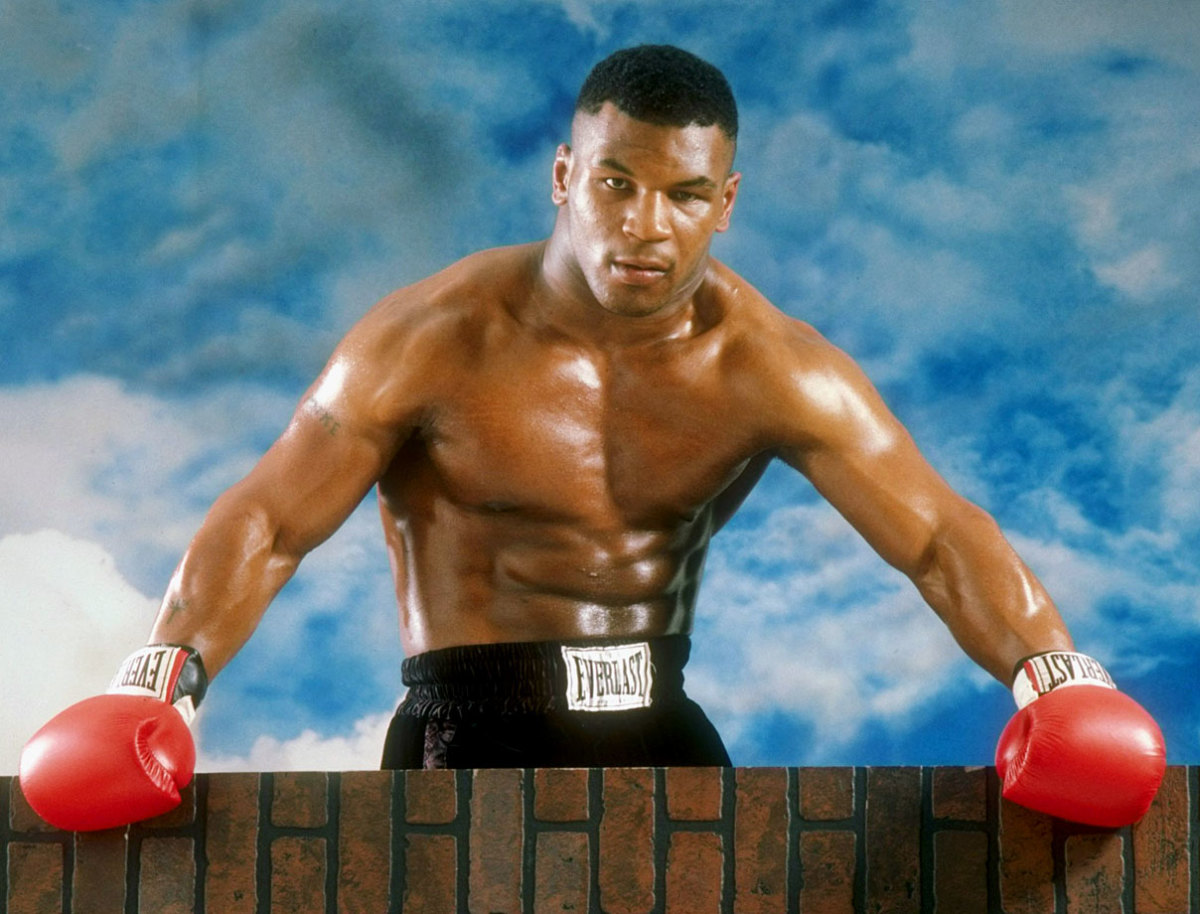
In his heyday, Mike Tyson was an intimidating boxer.
1987
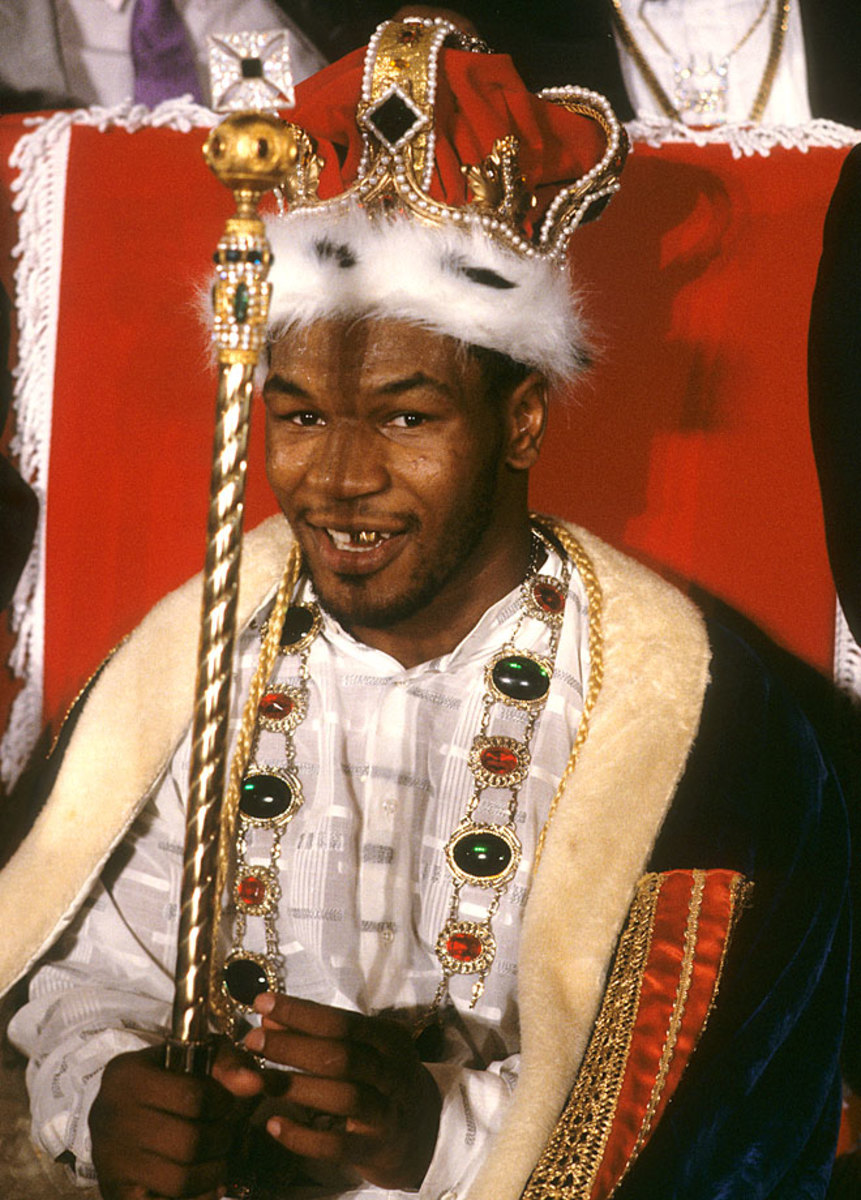
Before a match against Tony Tucker in Las Vegas, Mike Tyson was king for a day.
1988
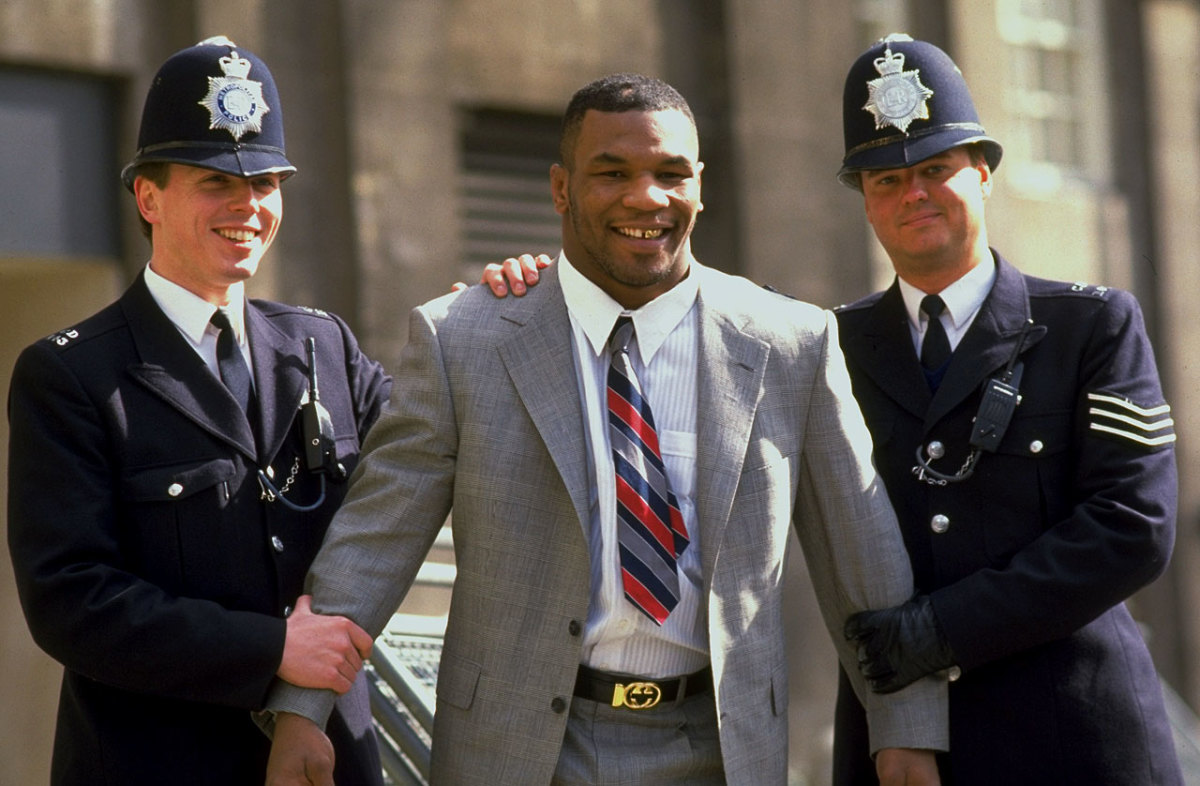
Metropolitan police collar Mike Tyson on a visit to London.
1988
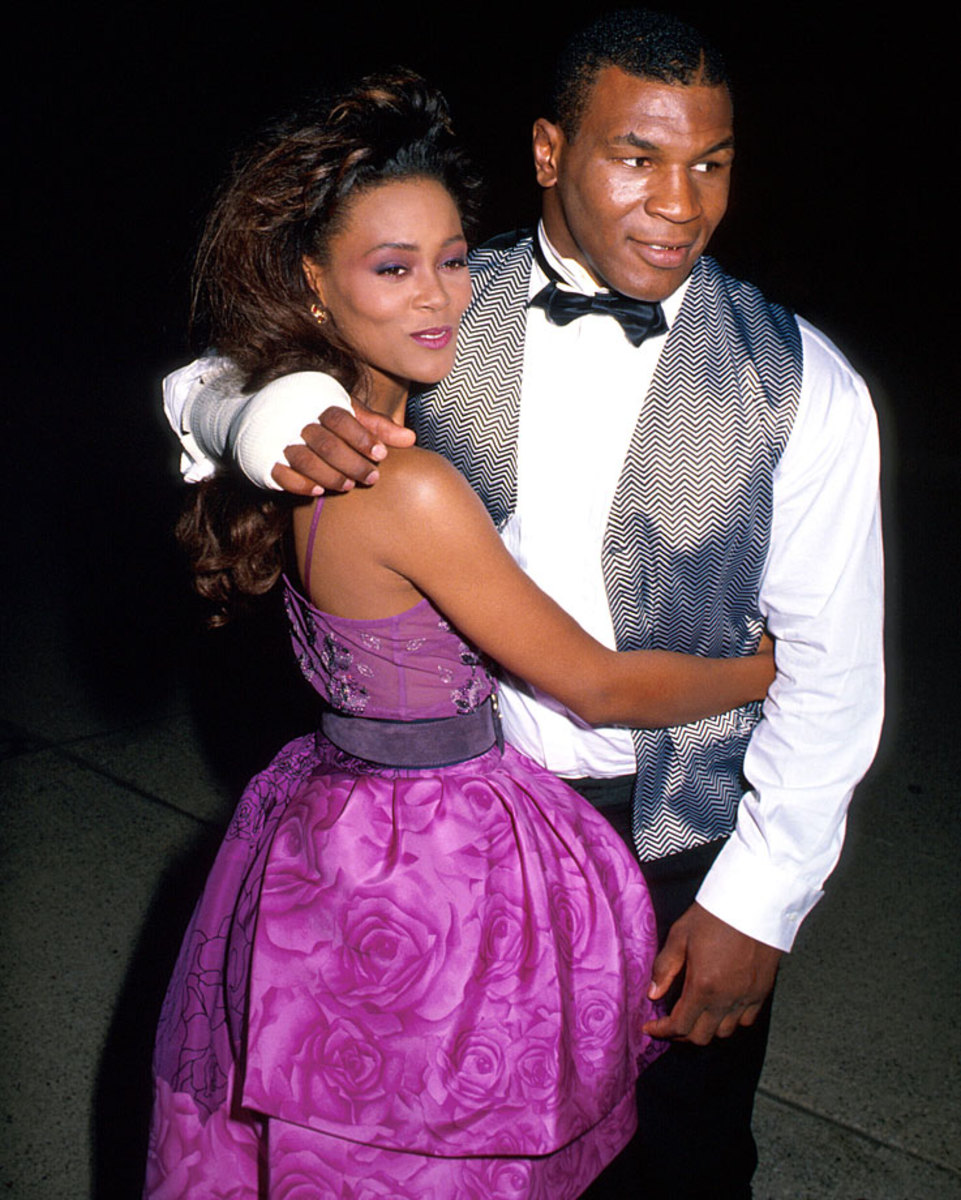
Mike Tyson poses with his first wife, actress Robin Givens, at a Los Angeles party.
1989
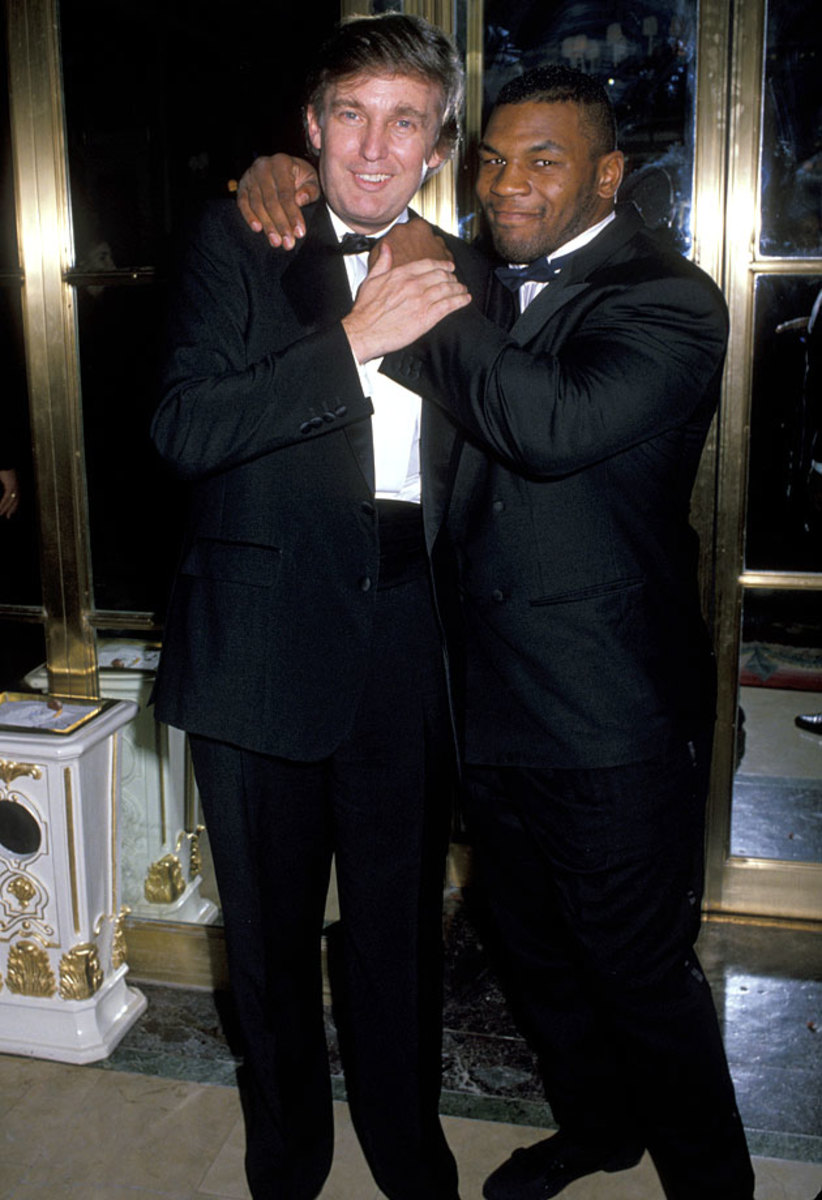
Donald Trump and Mike Tyson pose during the Annual March of Dimes Gourmet Gala at the Plaza Hotel in New York City.
1989
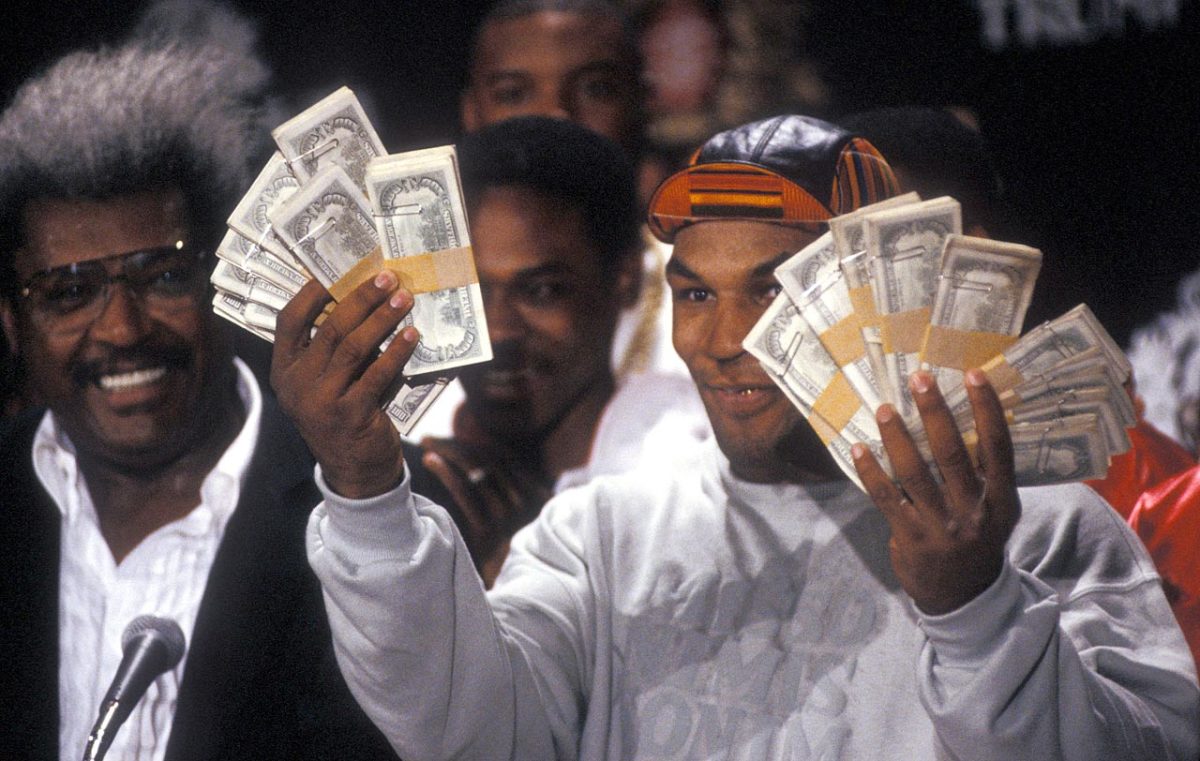
Mike Tyson shows off his money during a press conference for his 1989 fight against Carl Williams.
1994
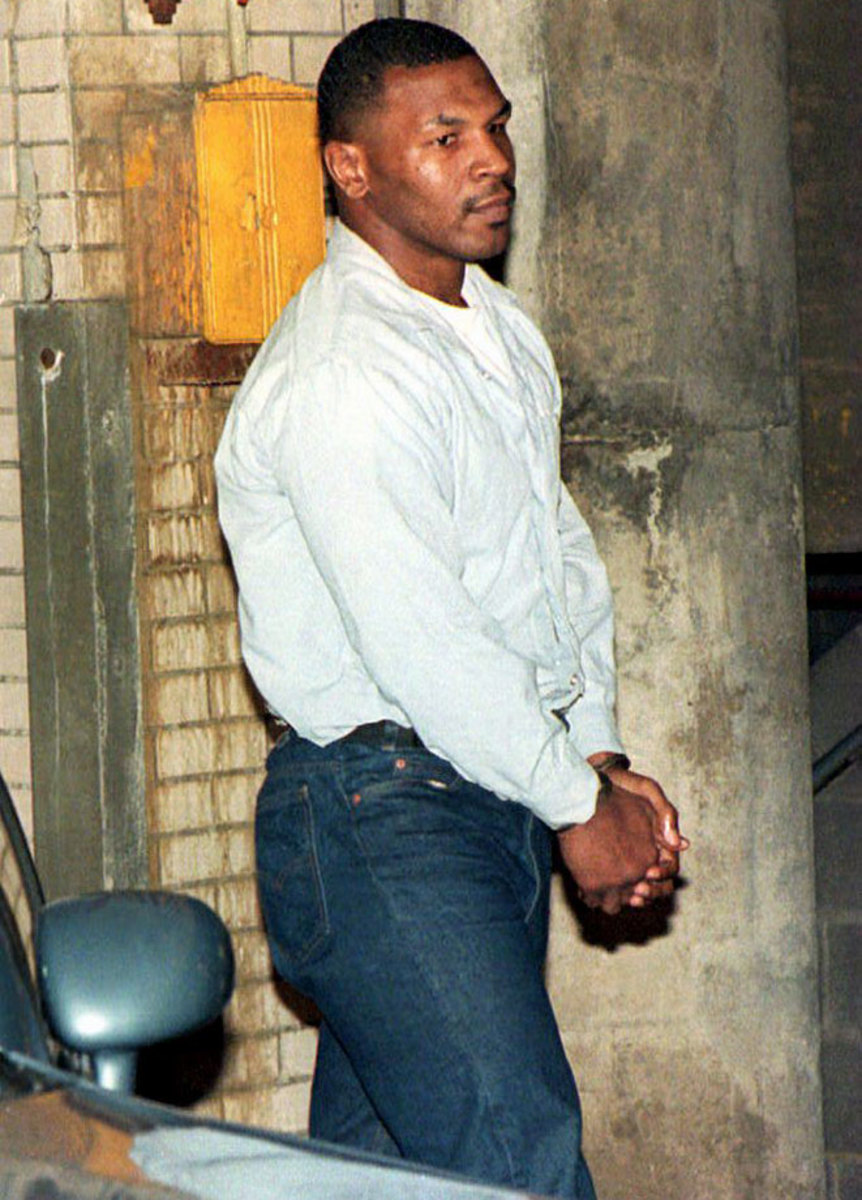
Mike Tyson walks into the Marion County Courthouse after being convicted of rape in an Indianapolis courtroom.
1995
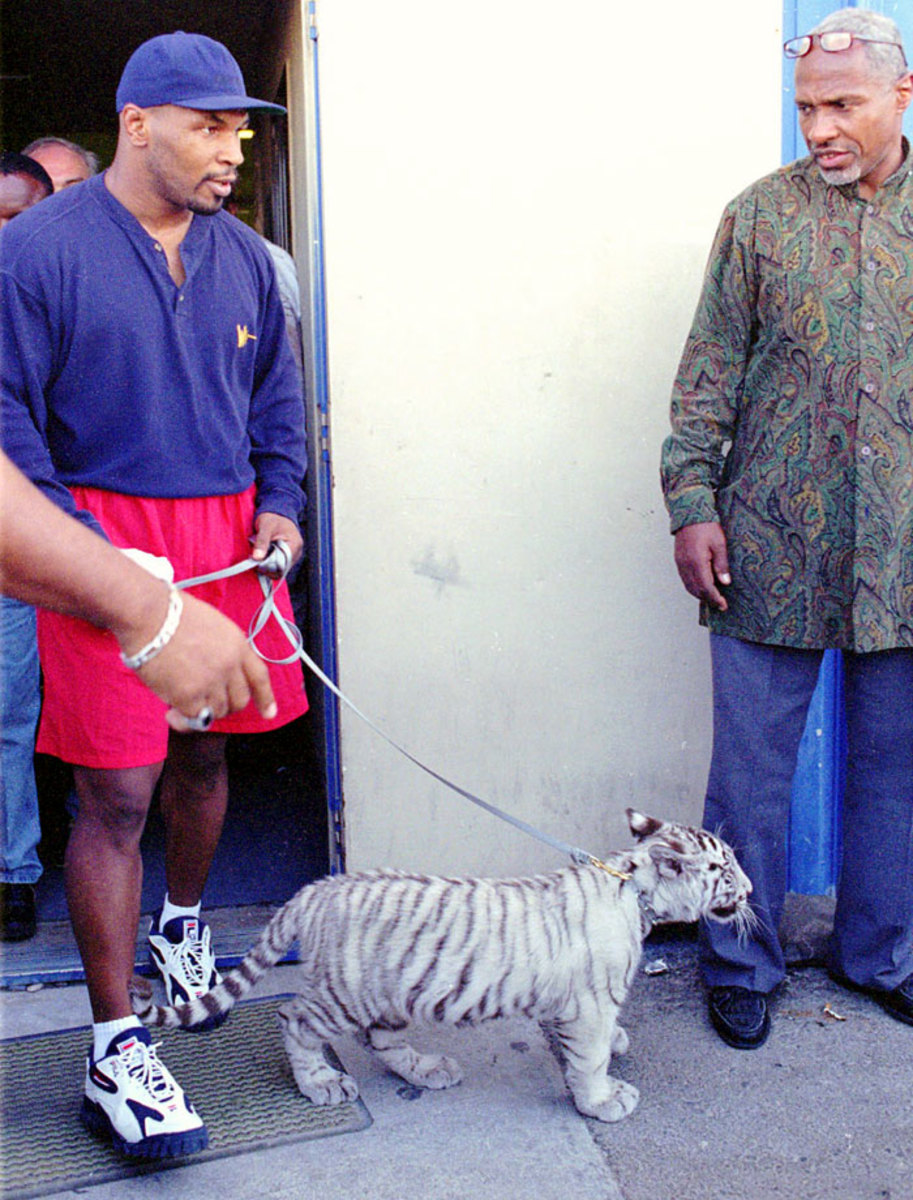
Mike Tyson leaves the Golden Gloves Gym with his pet tiger ''Kenya'' after a workout session in Las Vegas.
1997
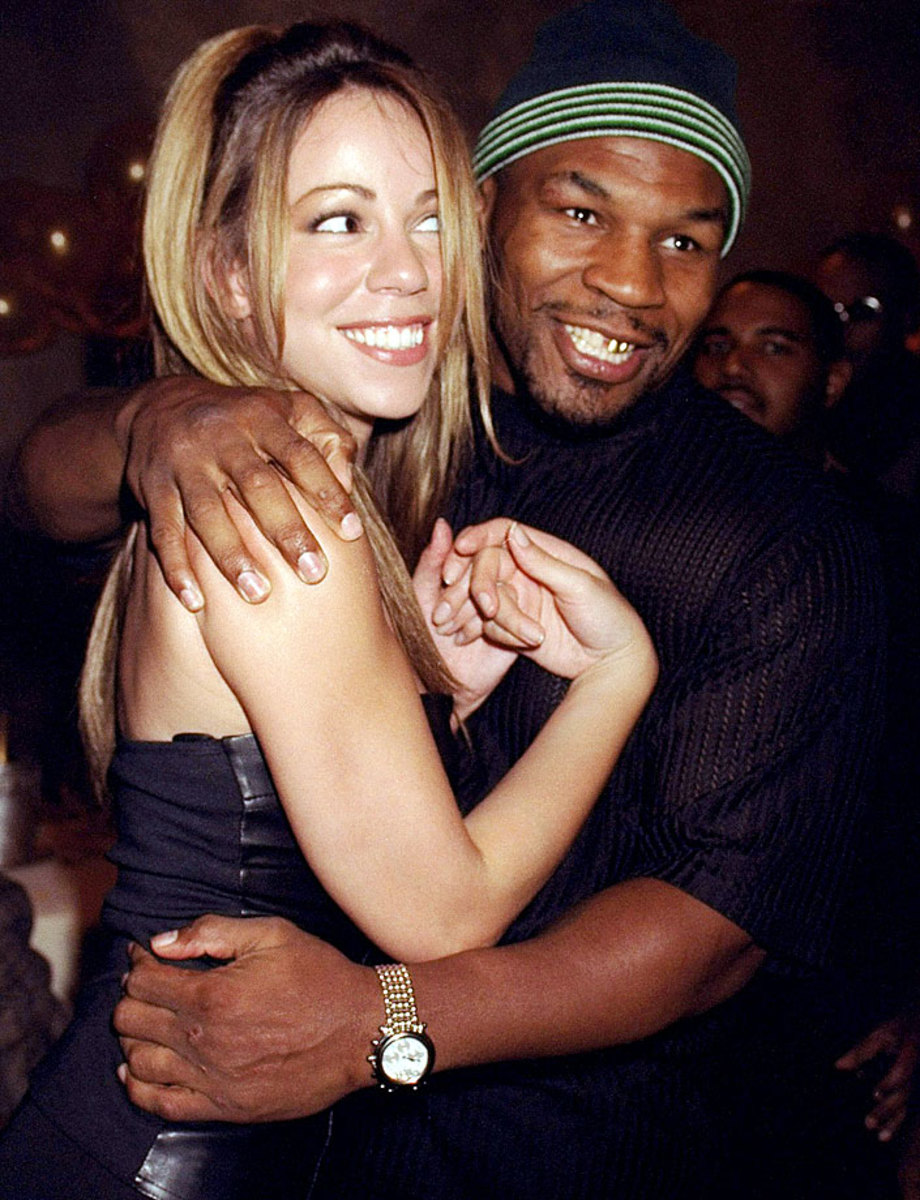
Mike Tyson hugs Mariah Carey during the opening of Sean ''Puffy'' Combs' new restaurant Justin's in New York City.
1998
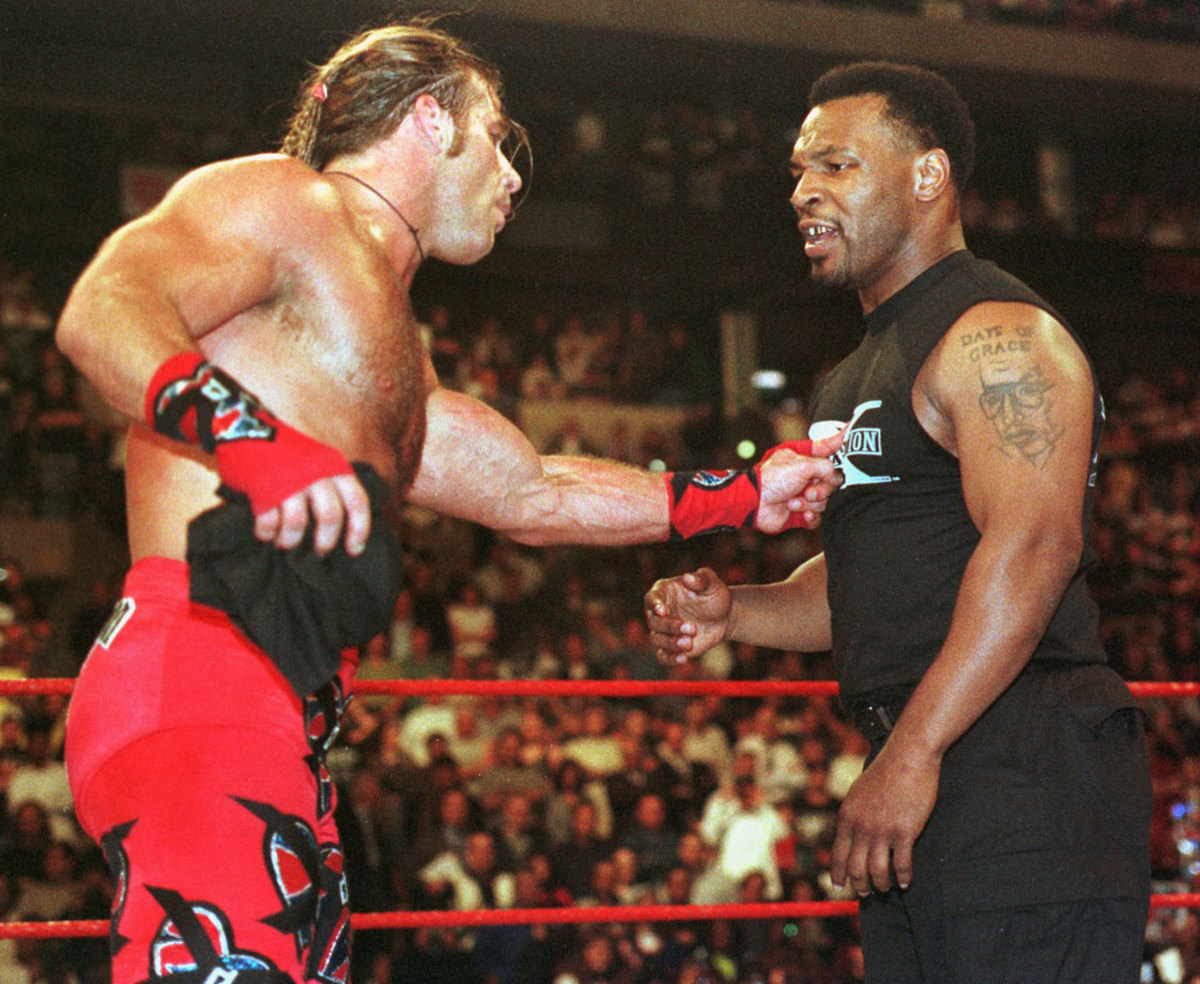
Mike Tyson gets a finger in the chest from wrestler Shawn Michaels during Wrestlemania XIV at the Fleet Center in Boston.
1998
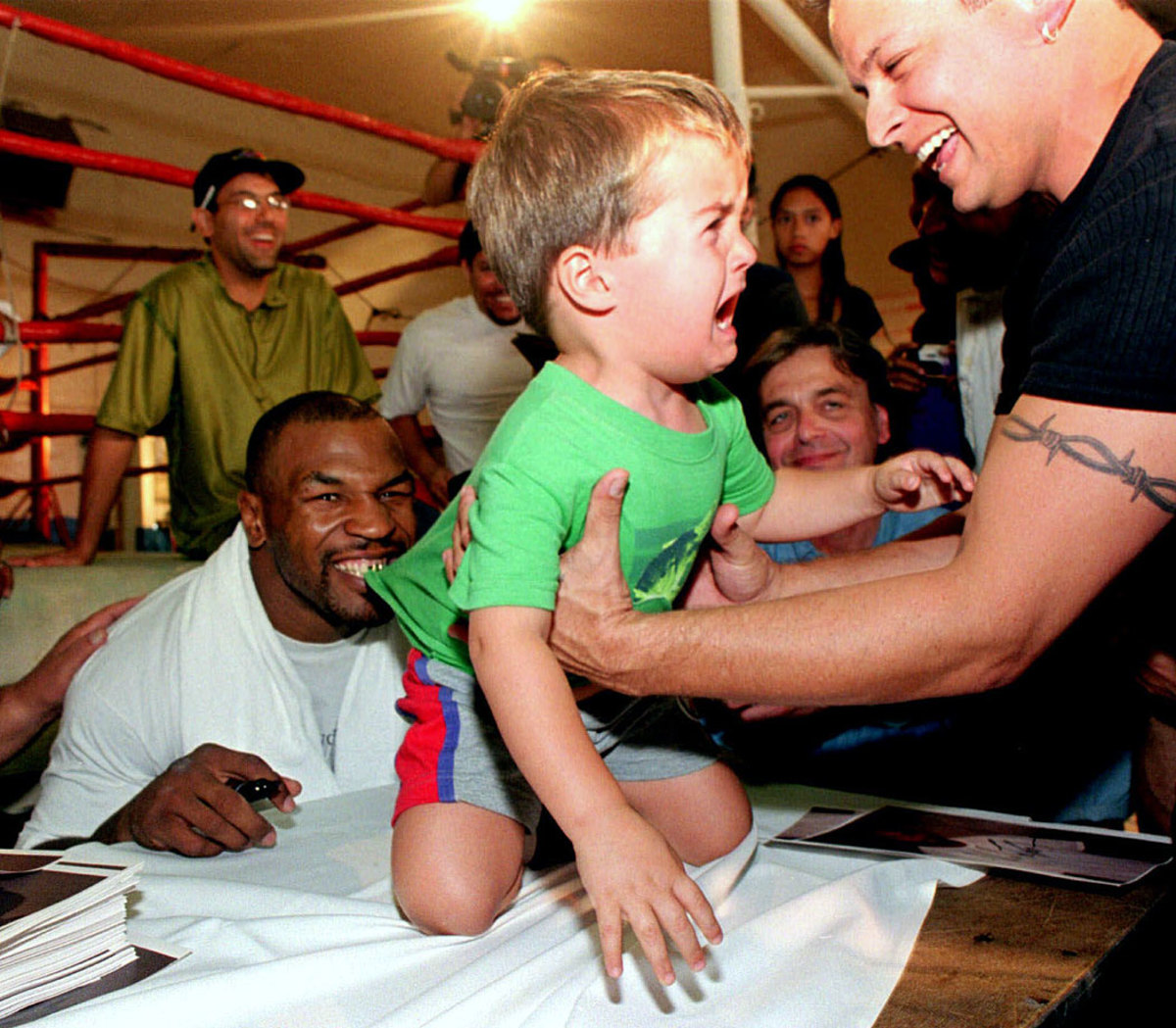
Two-year-old Florin Bouros of Tempe, Ariz., cries as he reaches for his father as boxer Mike Tyson playfully bites at his shirt at a downtown Phoenix gym where people came to see Tyson work out.
1998
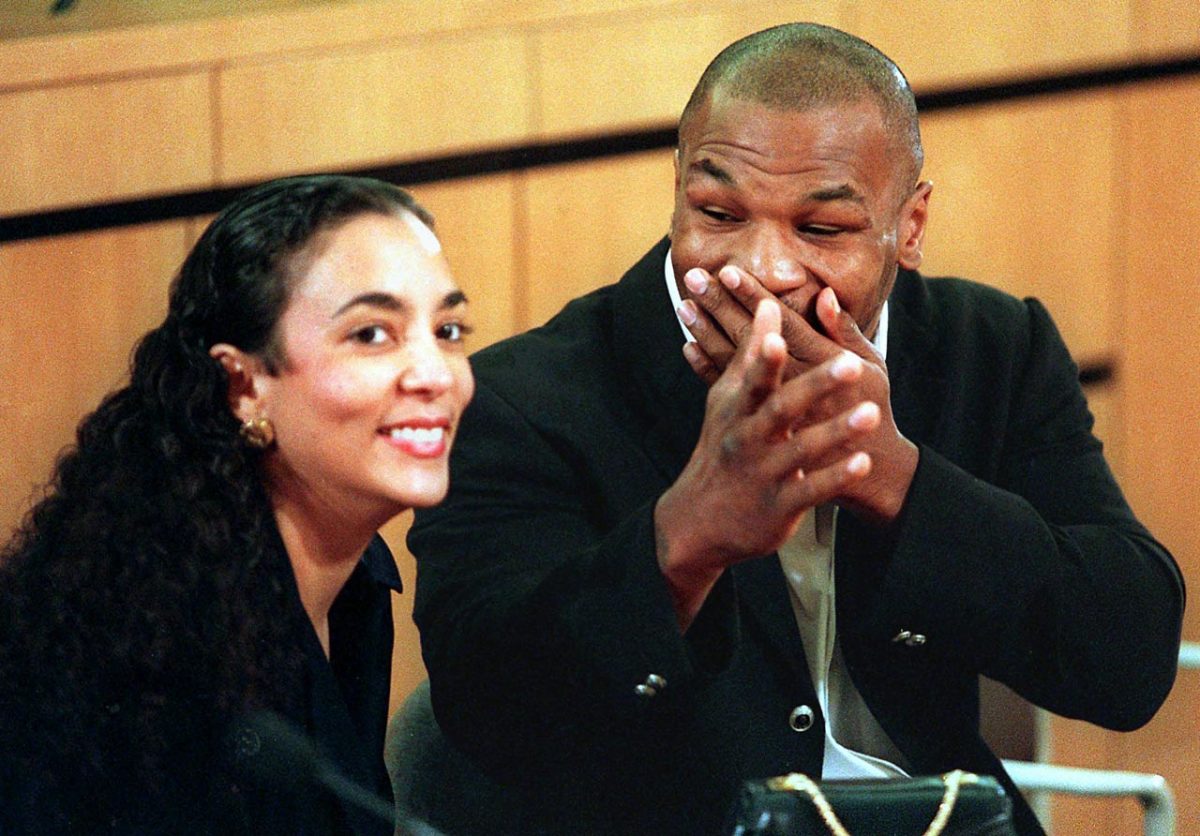
Mike Tyson reacts to comments from his wife, Monica Turner, as they wait to answer questions from the Nevada State Athletic Commission at the start of Tyson's reinstatment hearing to allow him to box again. The commission later voted to reinstate Tyson, more than a year after he was banished from boxing for biting the ear of Evander Holyfield.
2002
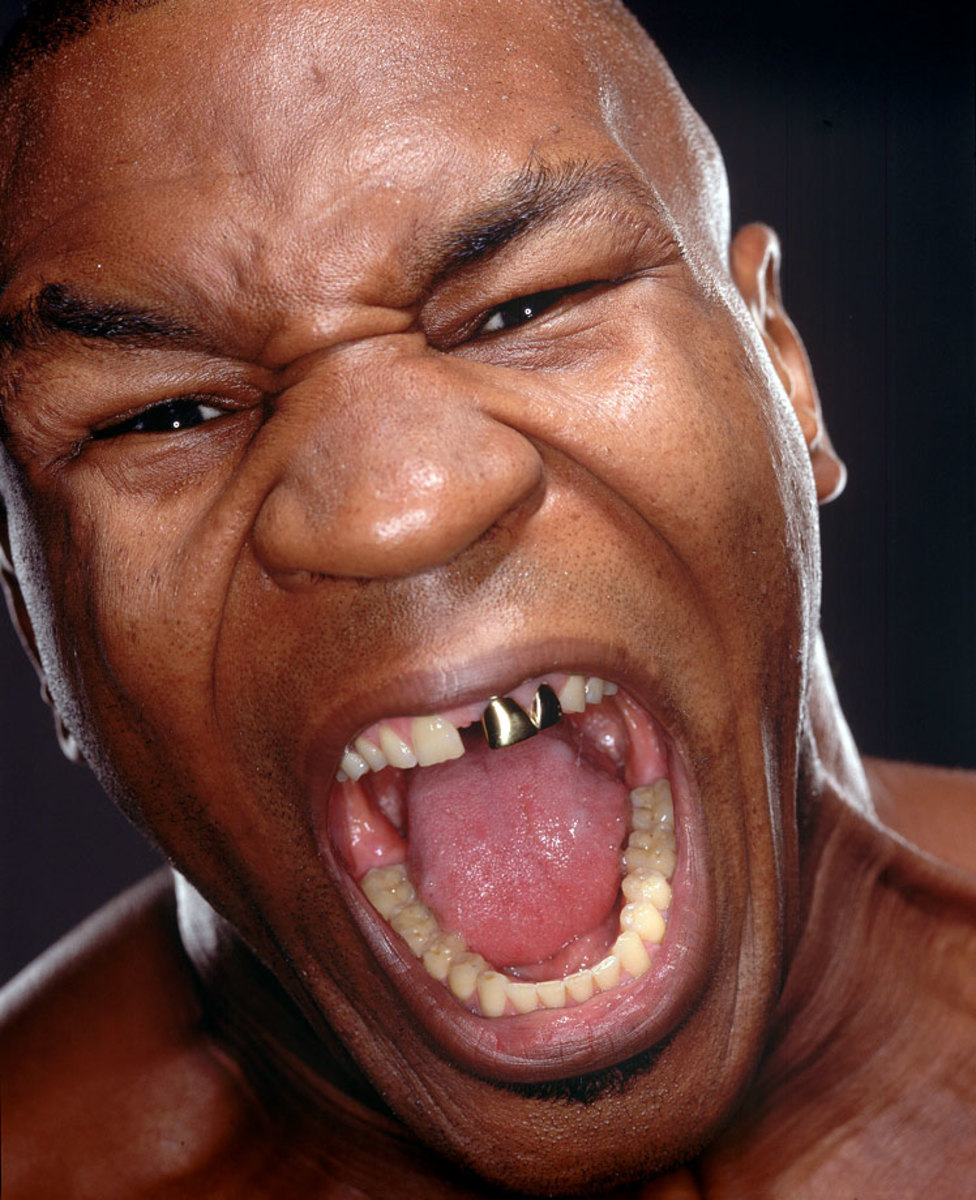
Mike Tyson puts on his ''Screaming Man'' face during an SI photo shoot.
2002
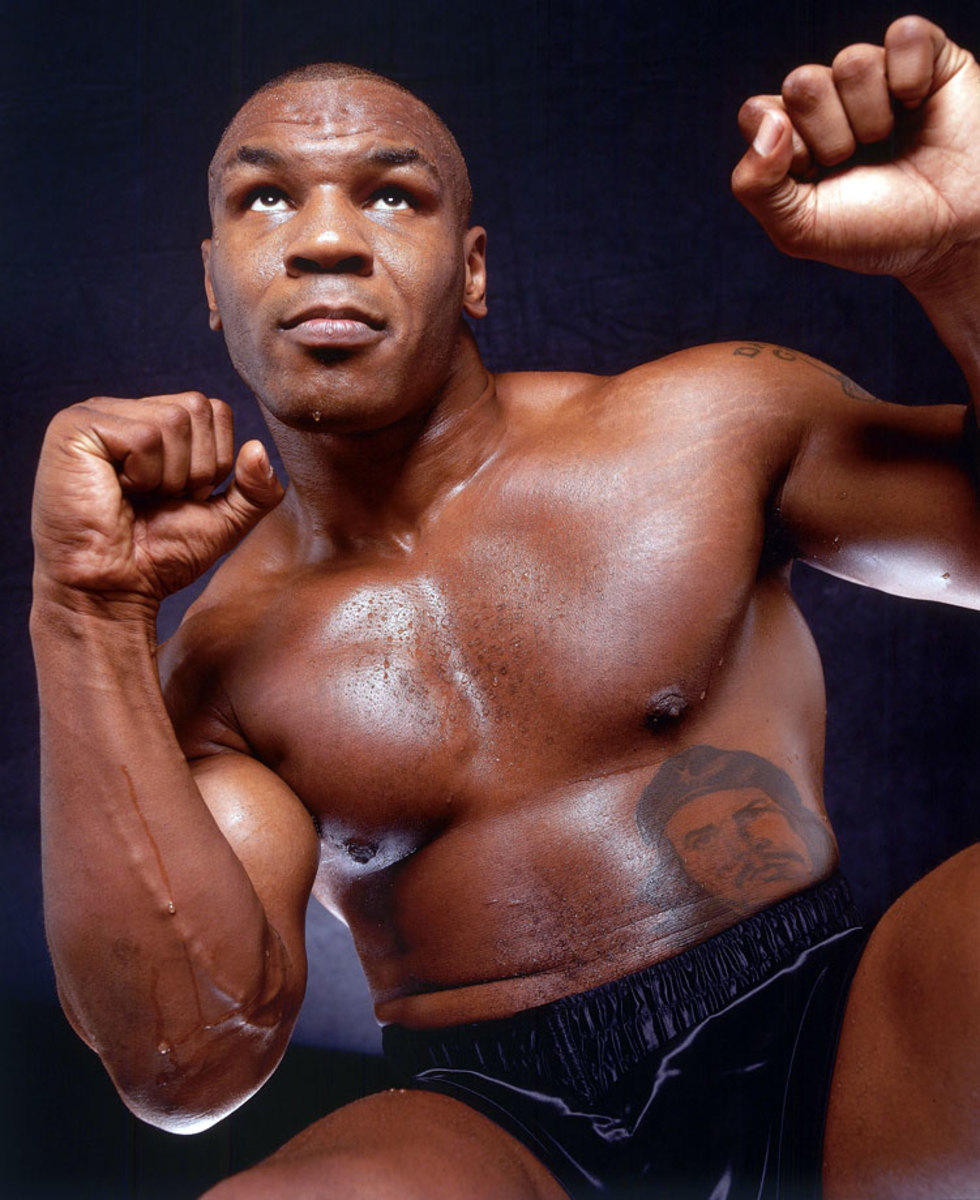
Mike Tyson shows off his boxing stance.
2003
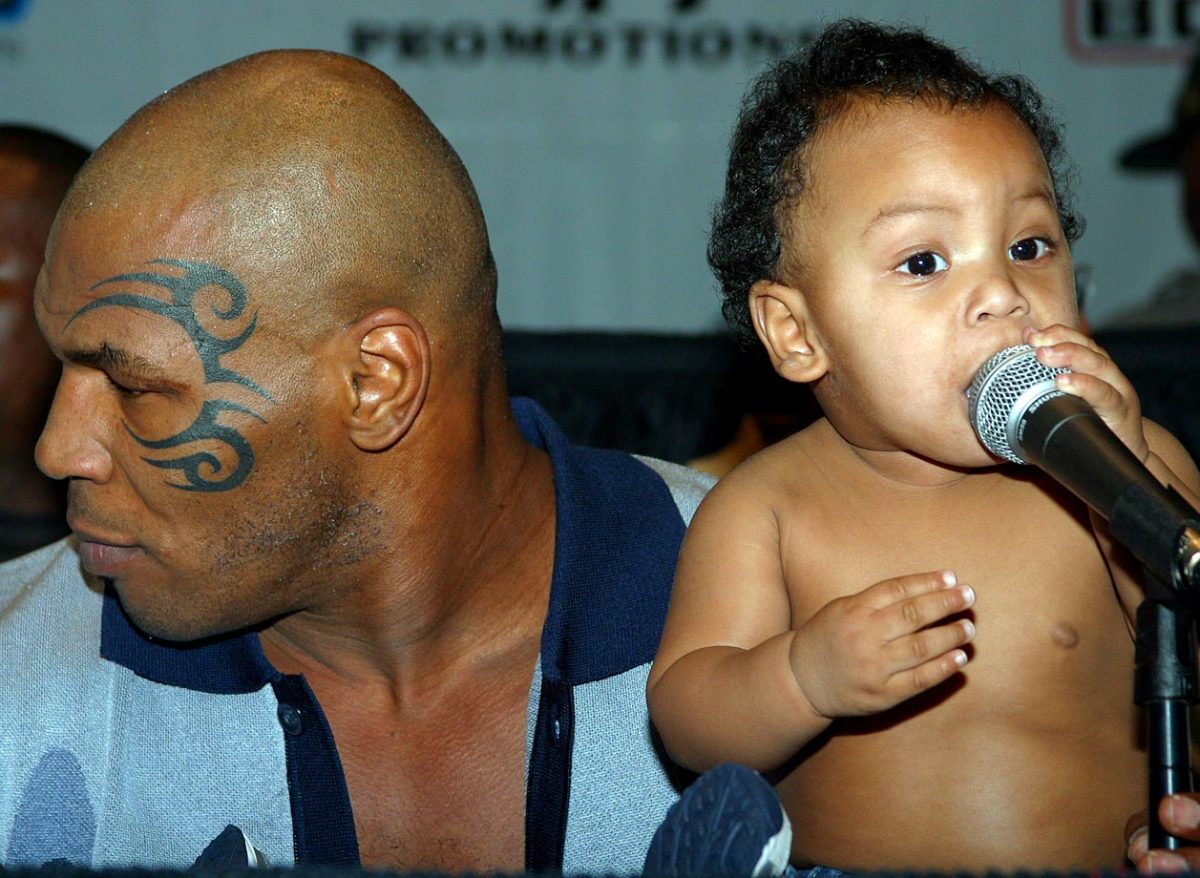
During a press conference for his fight against Clifford Etienne in Memphis, Mike Tyson let his son Miguel speak into the microphone.
2003
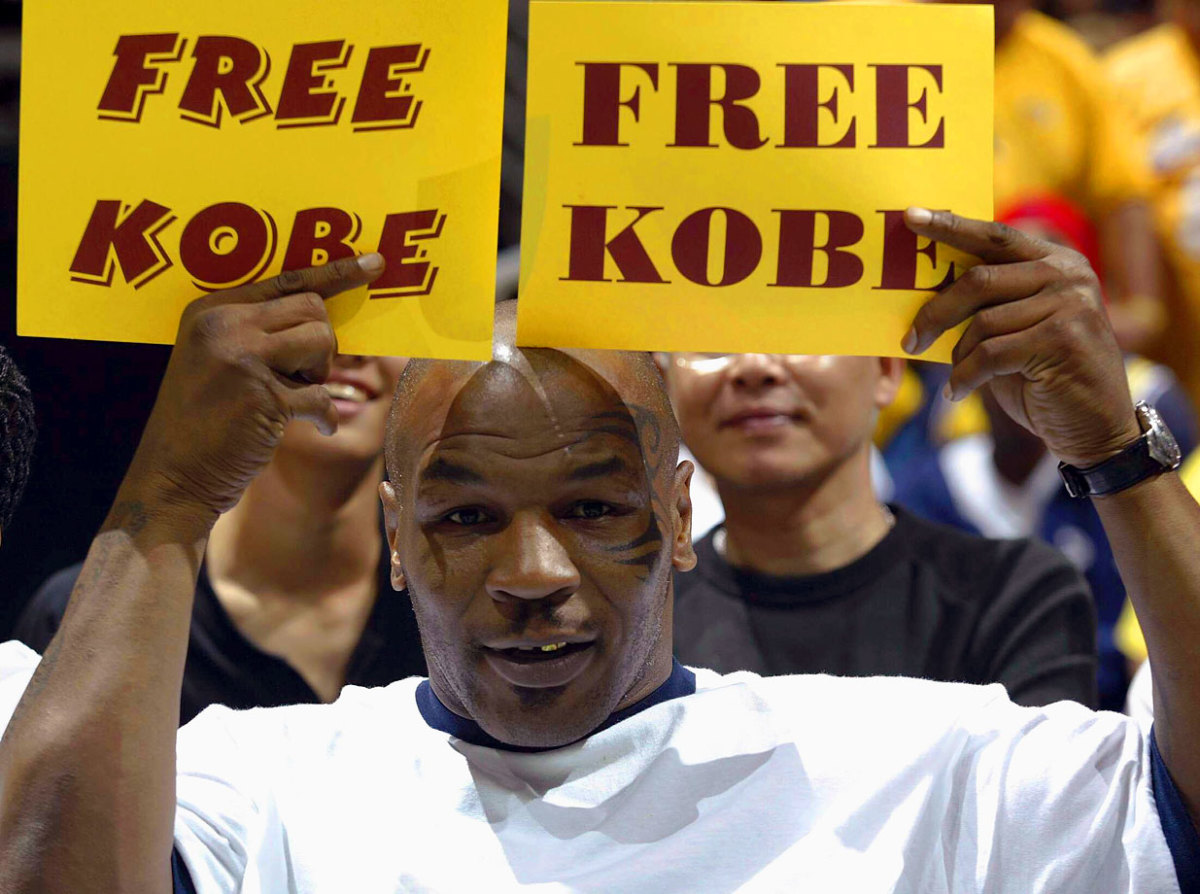
Mike Tyson shows his support for Kobe Bryant during a Clippers-Lakers preseason game at Staples Center.
2005
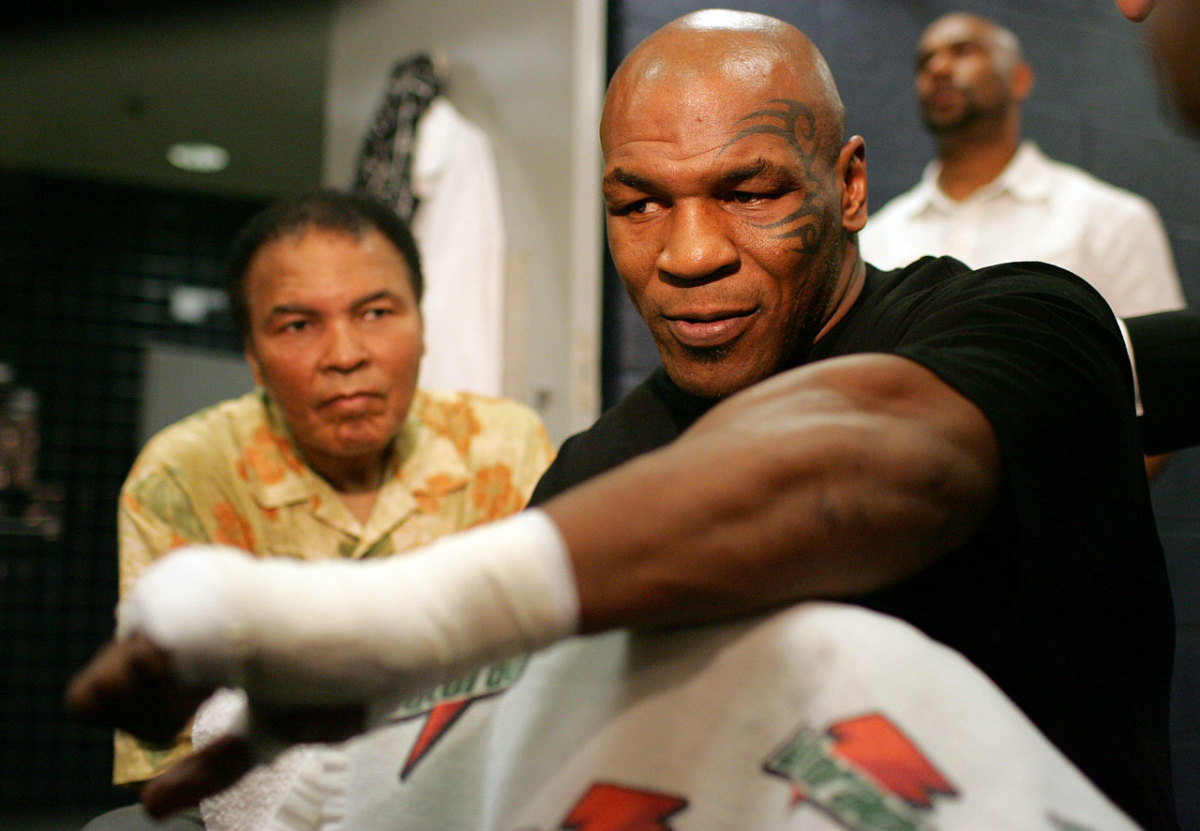
Muhammad Ali sits with Mike Tyson as he gets his hand wrapped before his fight with Kevin McBride in Washington, D.C.
2007
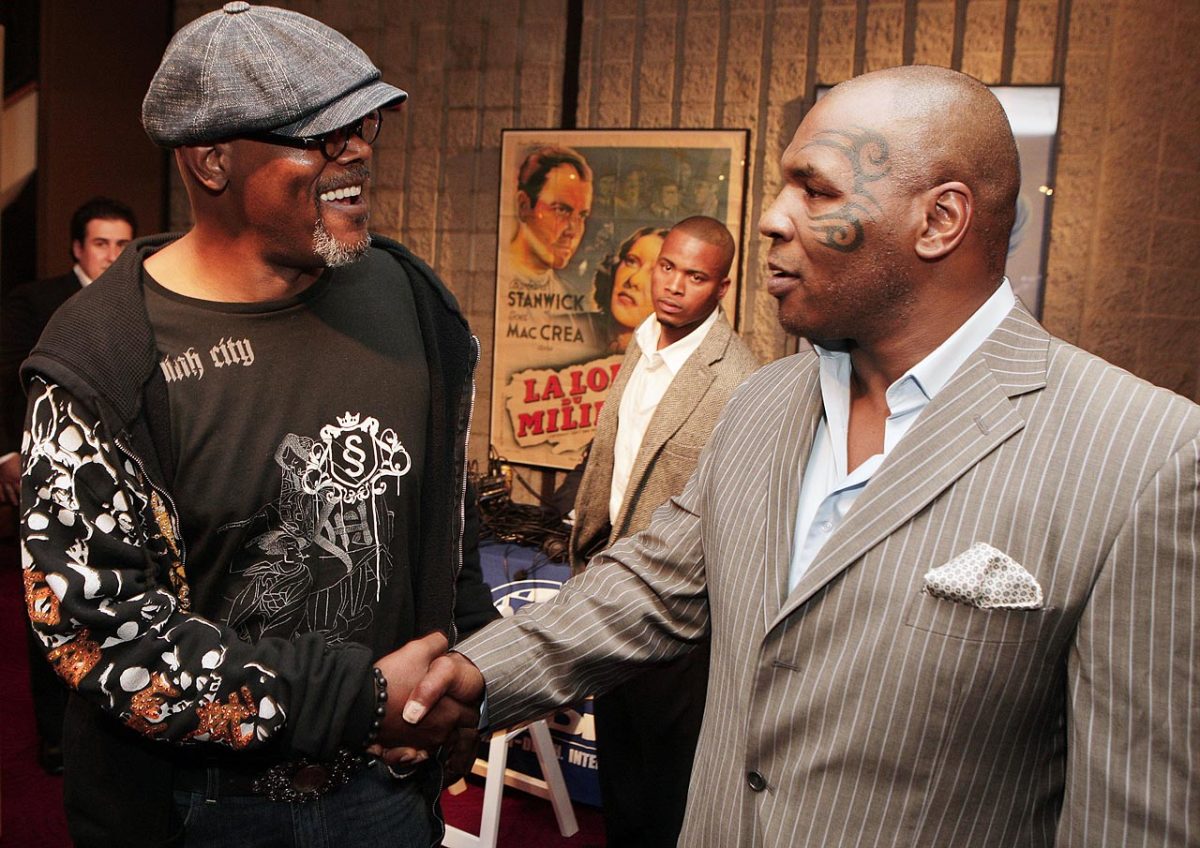
Samuel L. Jackson shakes hands with Mike Tyson at the afterparty for the premiere of Yari Film's "Resurrecting the Champ" at the Academy Theater in Beverly Hills.
2008
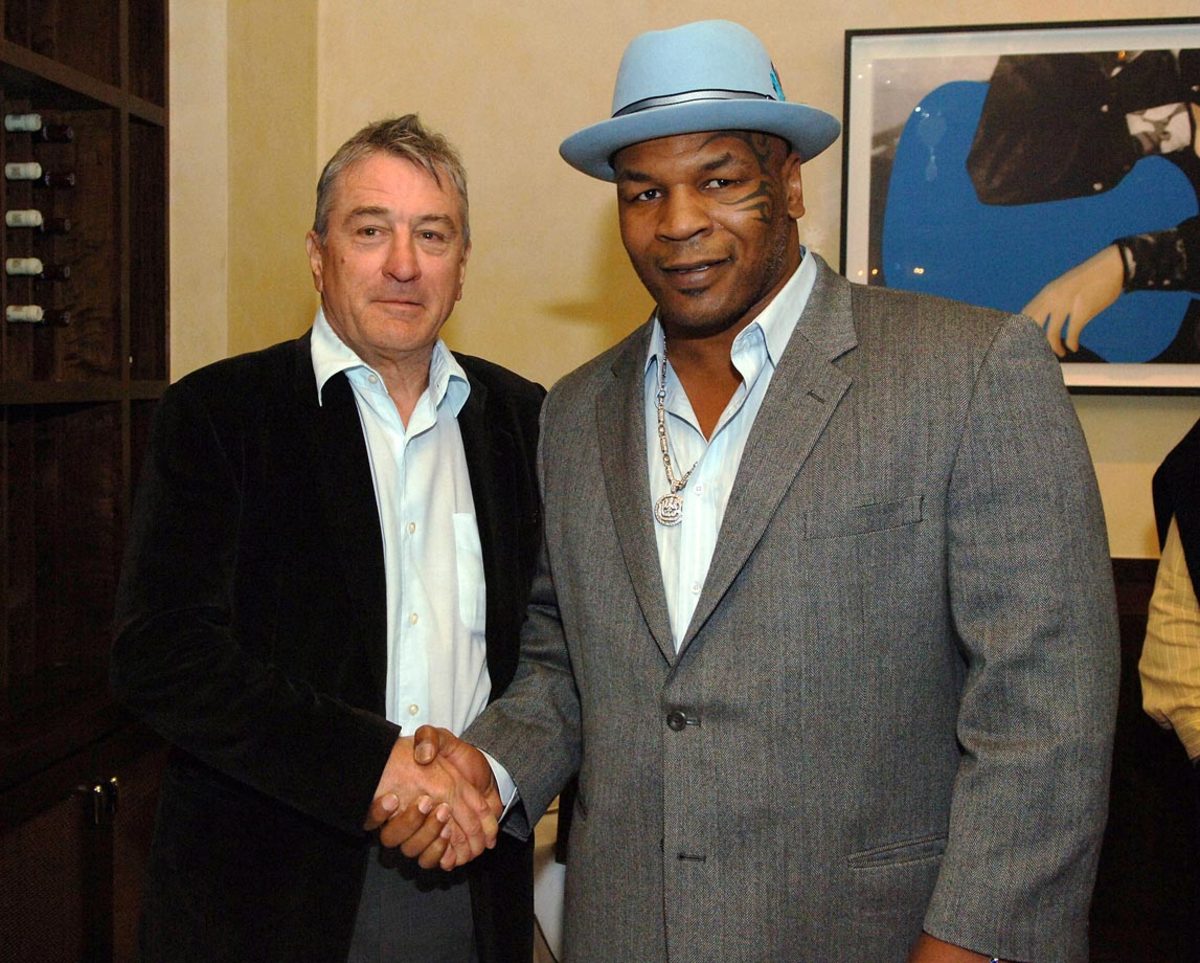
Robert De Niro and Mike Tyson pose together as they attend the AGO Grand Opening at Hard Rock Hotel & Casino in Las Vegas.
2011
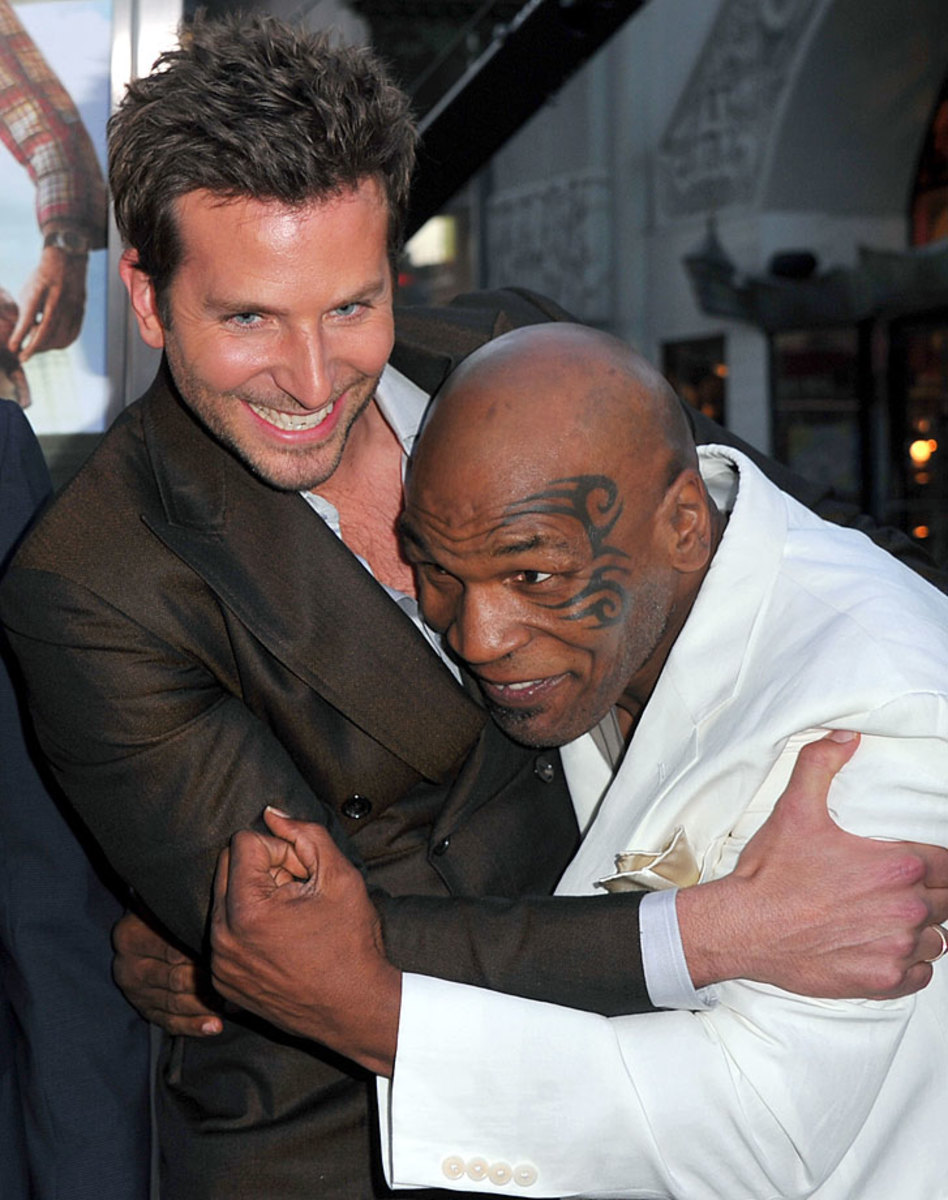
Bradley Cooper and Mike Tyson joke around at the premiere of "The Hangover Part II" held at Grauman's Chinese Theatre in Los Angeles.
2014
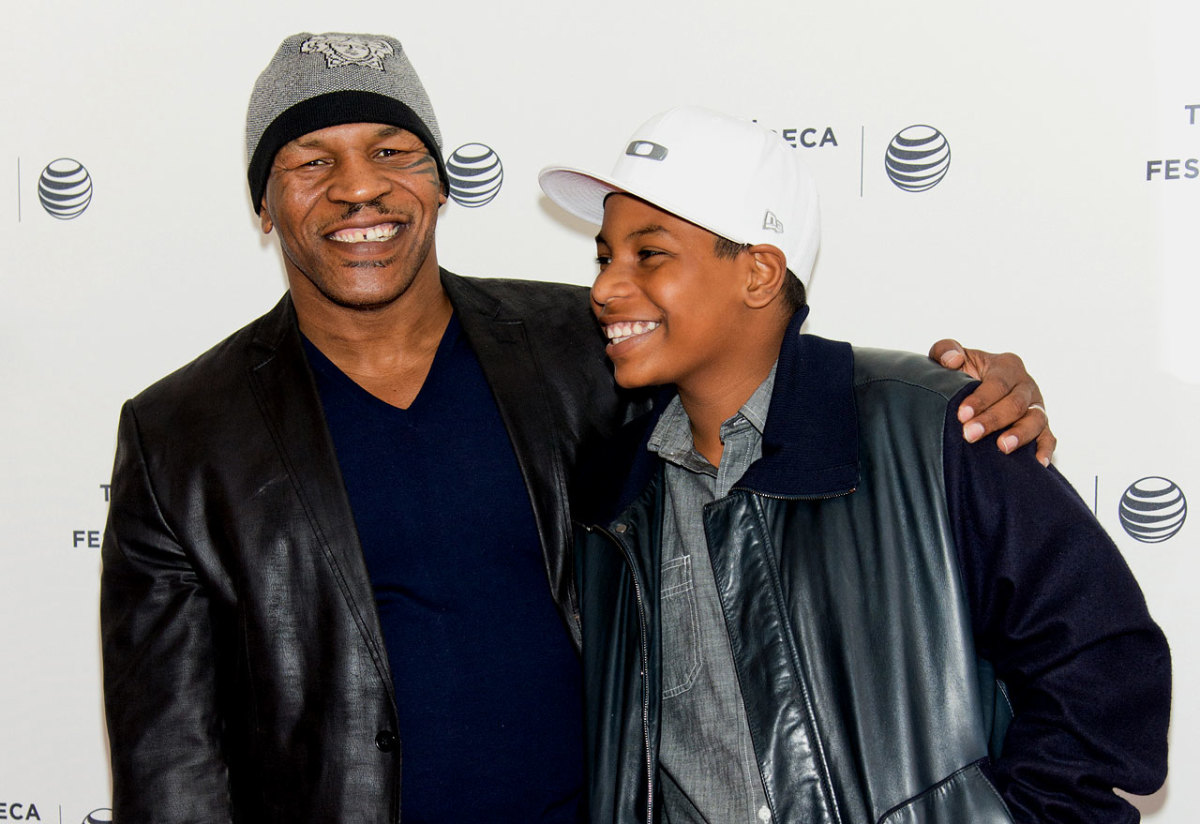
Mike Tyson and his son Miguel attend Tribeca Talks: After the Movie: "Champs" during the 2014 Tribeca Film Festival at SVA Theater in New York City.
2014
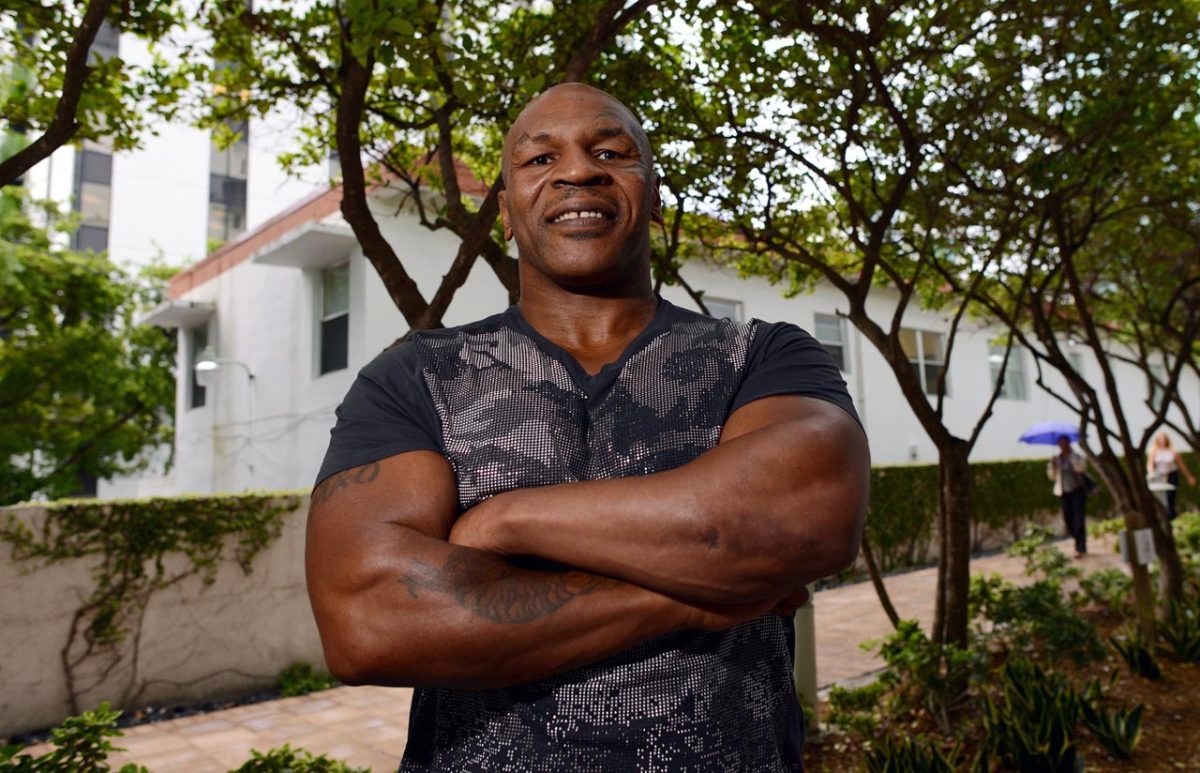
Mike Tyson spent time in Miami with his son to watch the NBA Finals as he begins his new career as a fight promoter.
2014
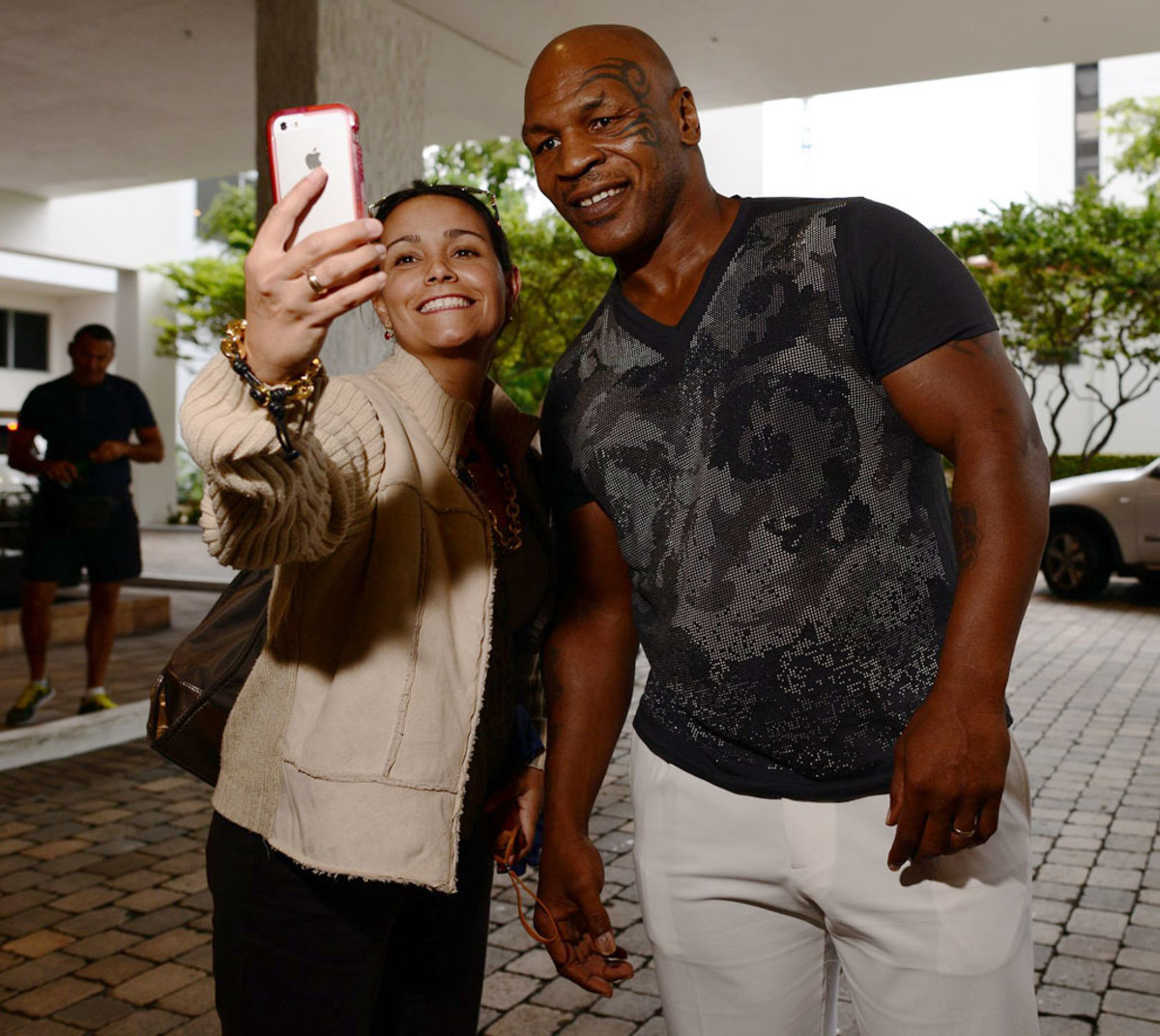
Mike Tyson stops to take a selfie with a fan.
2014
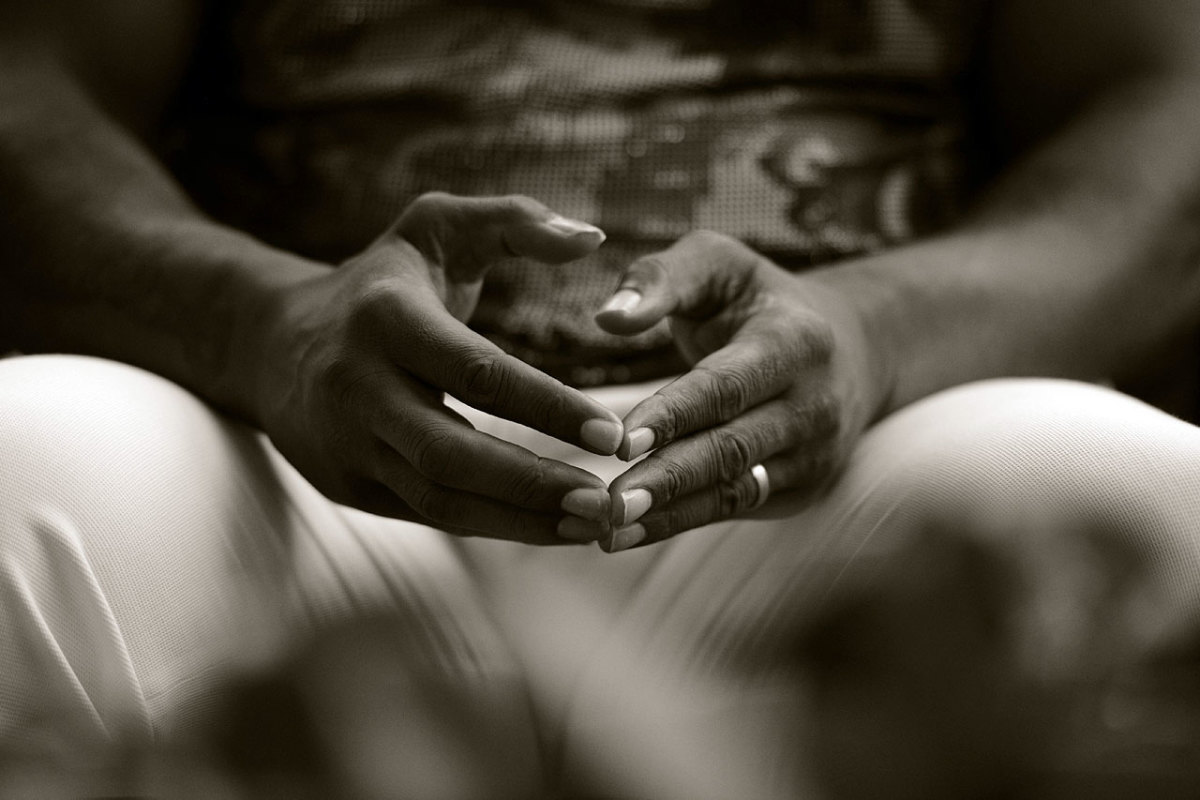
At age 47, Mike Tyson weighed in on LeBron James and the spotlight. "Criticism gets to all of us. I don't care if it's just a small part of it. People don't like being corrected, even if [they're doing] the wrong thing. We want to make ourselves better so we don't have to listen to criticism. We're in a perfection-obsessed world, which can never happen."
2014
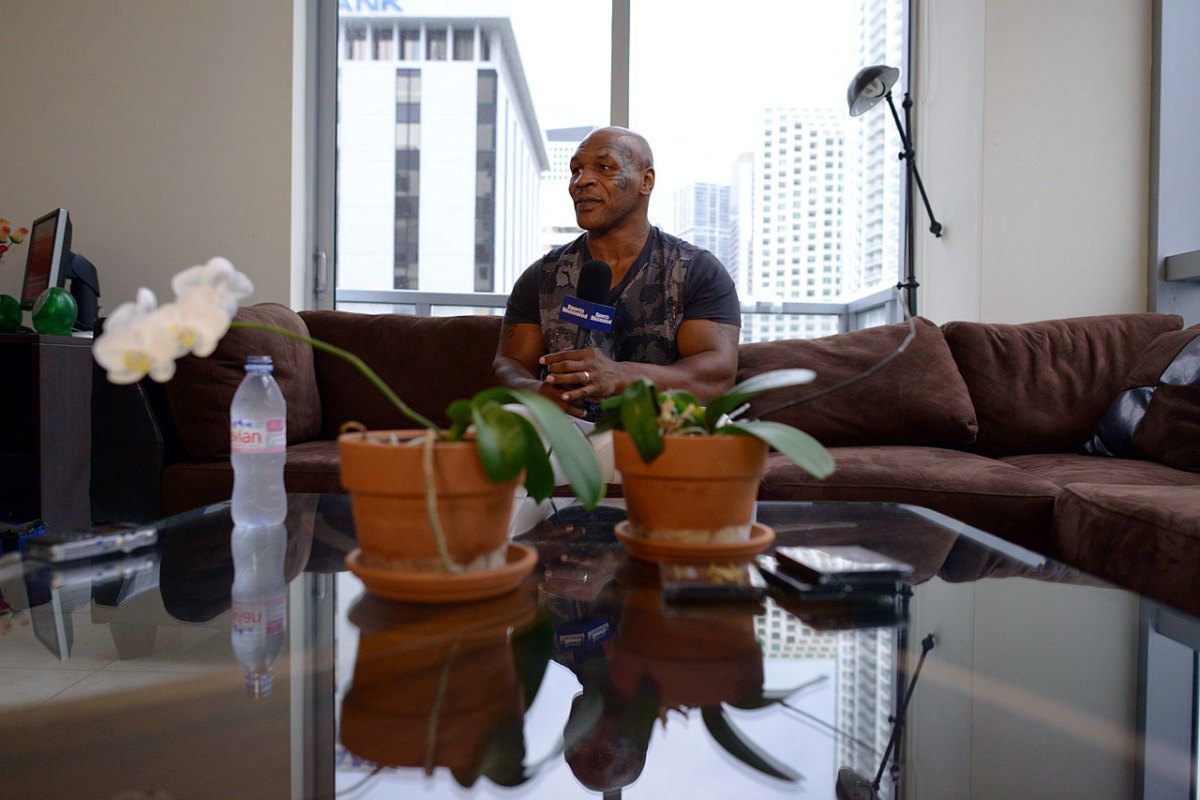
While in Miami, Mike Tyson hyped a July 10 fight between Argenis Mendez and Rances Barthelemy at American Airlines Arena.
2016
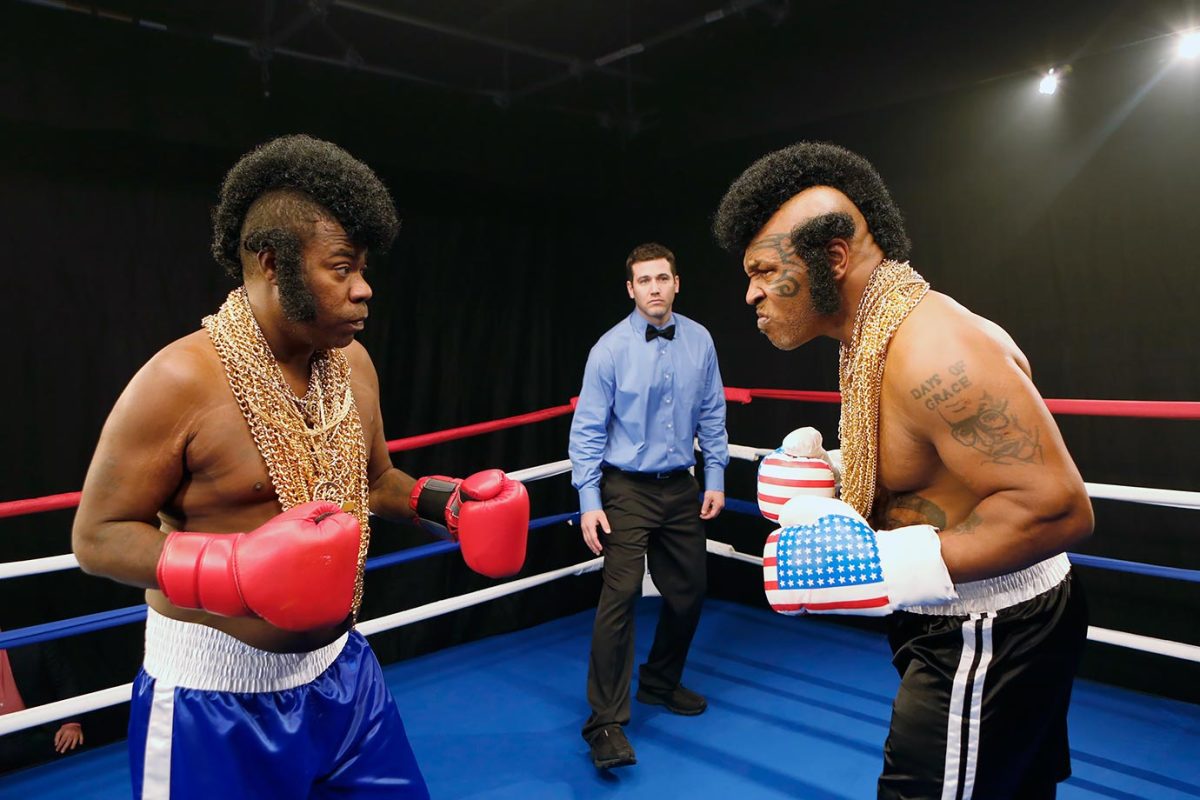
Tracy Morgan and Mike Tyson film a fake sequel to the movie Creed, entitled Clubber, for "Jimmy Kimmel Live: After The Oscars."
2016
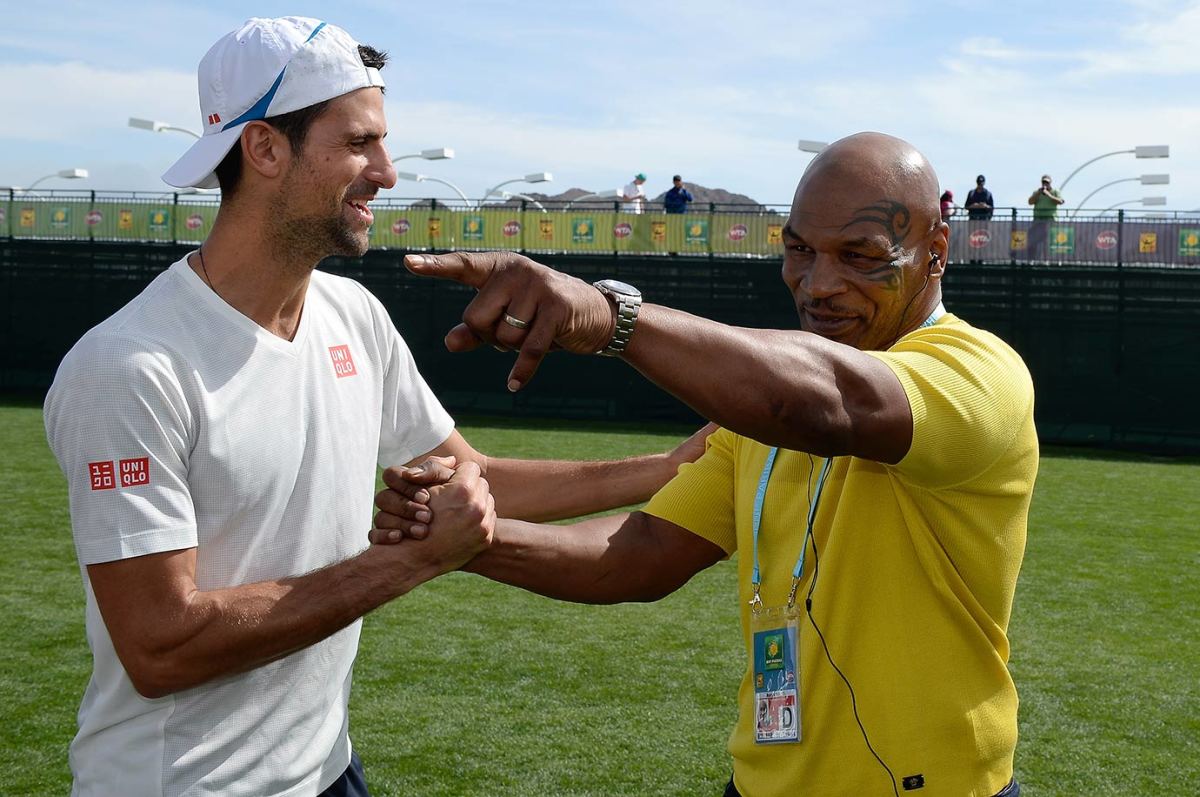
Novak Djokovic meets Mike Tyson during day seven of the BNP Paribas Open at Indian Wells, Calif.
2016
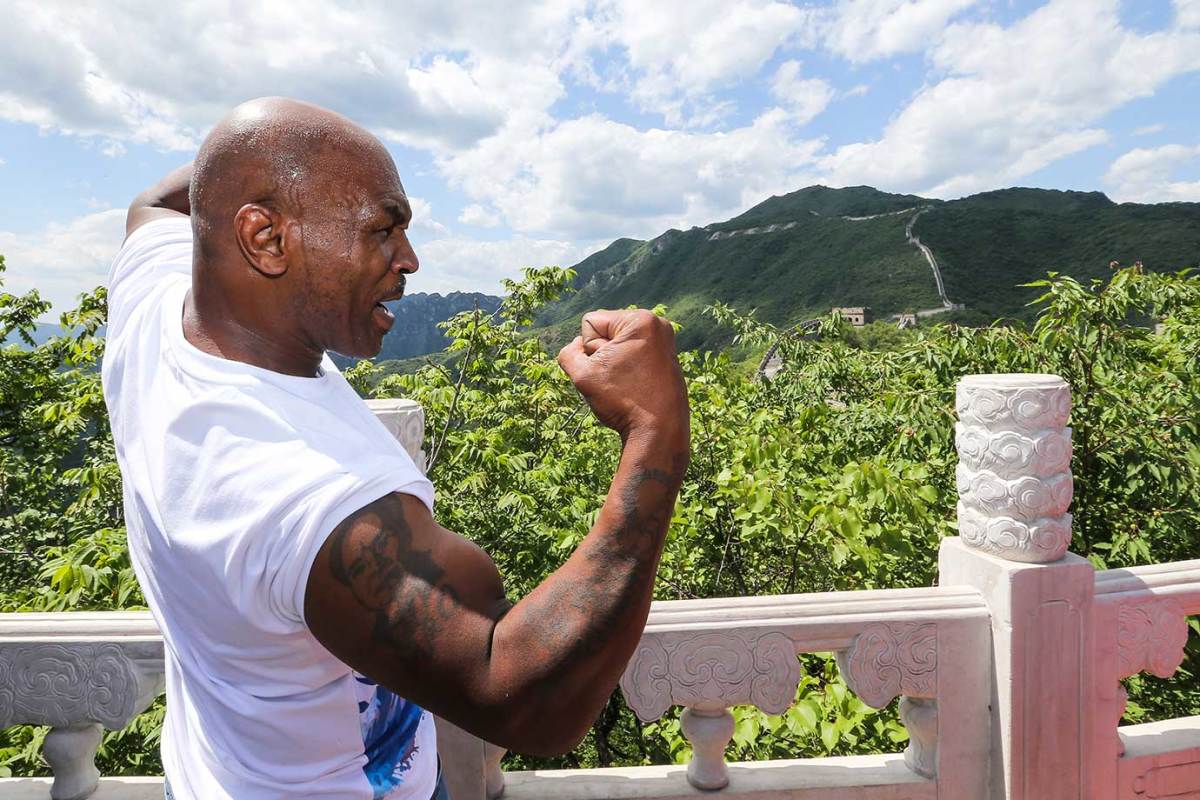
Mike Tyson poses on the Great Wall in Beijing, China.
2016
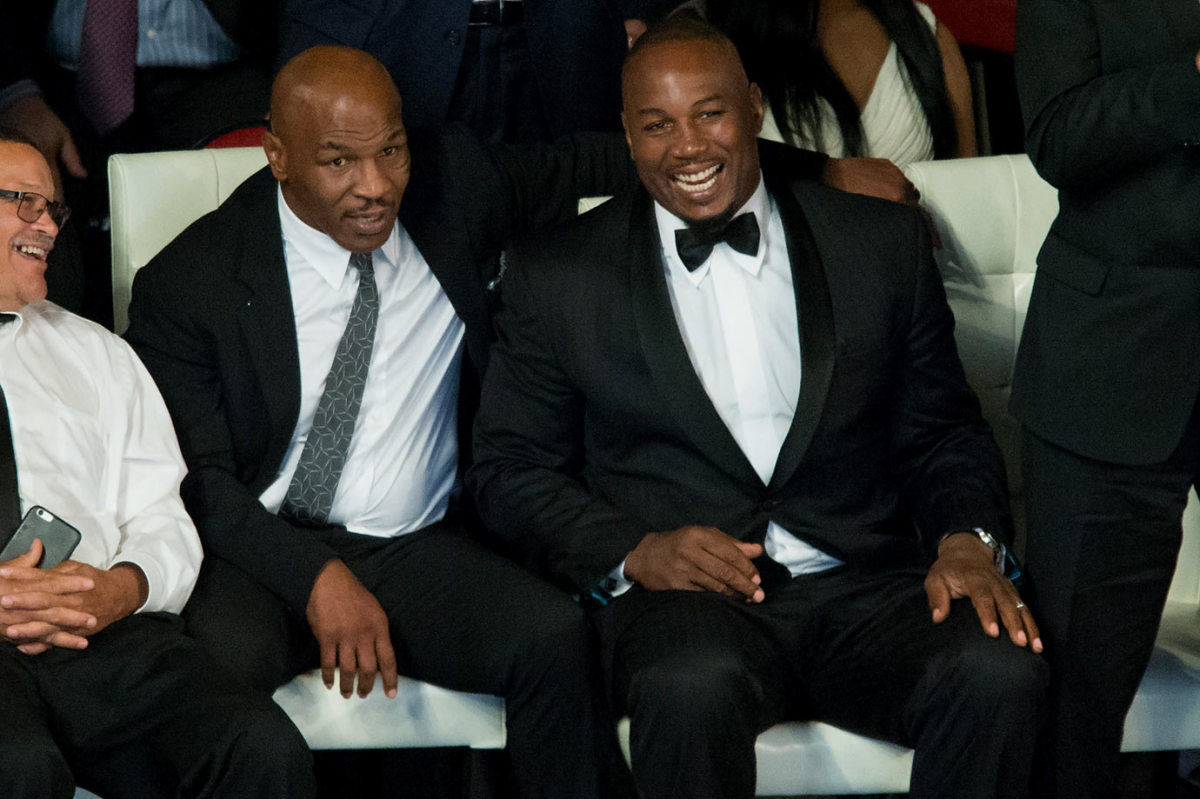
Mike Tyson and Lennox Lewis attend the memorial service for Muhammad Ali in Louisville, Ky.
Lennon: Bedlam broke out. There is mayhem in the ring. It was dodgy. My next memory of that was how long it was before I was given the OK to announce the decision. It was 10-12 minutes later before I was given the signal. I remember a lot of the writers, commentators and so forth still asking what's happening. We don't know and it's been 10 minutes!
Giachetti: It was tragic. I went and spoke to him afterward to try and ask him what happened. He told me it was like fighting in a street fight. He didn't plan it. It was just a rage thing that happened. I told him he was in shape and that he could have finished the guy off. He was afraid with his eye bleeding that they'd stop the fight.
Mitch Libonati, MGM Event Management: Eventually both fighters headed to their dressing rooms and that's when we were getting up into the ring. I remember the guys saying that it might be there. It was center-ring off to the left, and there was a piece on the ground. I said I'm going to grab this thing. I have my latex gloves on and I picked it up, put it in another latex glove and I took it to the locker room.
Brooks: I went back out and somebody had found a piece of his ear and gave it to me. I brought it to the locker room. We put it on ice and eventually tried to put it back on. I have no idea what happened to it afterward.
Libonati: I knocked on the door, I was a young kid and I was a huge fight fan. I came to the door and I said I think I have something of Evander's. He kind of just looked at me like "are you kidding me?", and I told him I've got the ear inside this latex glove. They looked at me like "holy crap!" They took it out of my hands and I was told it was put on ice.
Turner: Tyson bit the ear because he was looking for a way out. Plain and simple. He didn't think he could beat Evander Holyfield. So if he could get disqualified it wouldn't be a loss on his record.
The fight sent shock waves through the boxing world. Shots were reported at the MGM Grand after the fight (it is now believed to have been a champagne cork), and the fight became instant front page news. The state of Nevada would end up fining Tyson $3 million and suspending his license. Though Tyson suffered one of the harshest financial penalties in sports history, there were cries to ban Tyson for life. The headline of Sports Illustrated read "Madman!"; The Hollywood Wax Museum moved its statue of Tyson from its Sports Hall of Fame to its "Chamber of Horrors" and next to Hannibal Lecter. In her article, "Defending Tyson," author Katherine Dunn said "the press could scarcely be more inflamed if the guy had reached up Holyfield's rectum and ripped out his heart in front of the TV." Tyson never won another major fight in his career, while Holyfield would compete in high profile title bouts against Lennox Lewis and John Ruiz. The fight still resonates within the boxing community 15 years later.
Ratner: In the days following, it was absolute bedlam. This was not a sports page story; it was a front-page story. When that happens, it isn't just press. You have TV, morning shows, late night shows. Everything gets exacerbated even more. I remember when we had the hearing. It was at the City Hall downtown. It looked like one an antenna farm, all the trucks with all the antennas. They had to close streets down around the city. We ended up fining him $3 million and took a year out of his life.
Stradley: At the time [Tyson] was talking about the butts, but nobody wanted to hear it. As some years went by, and everybody started noticing that Holyfield does use his head, they started looking back at that fight and realizing that maybe there was some butting going on. The media jumped all over Tyson, the media wanted a bad guy and they got a bad guy. The media just went way overboard. They made it like the darkest day in American history.
Czyz: Look, Mike Tyson lost his mind. People say he's an animal. A piece of him is, but a piece of us all are in the fight game. I've said many times that you can't understand the pressure of a world championship fight. In fractions of a second, punches are whizzing past your head at 80-90 miles per hour. Some of them can take your head off. If I knew the very next punch I threw would kill the guy or I lost, that guy is going to die. It's an enormous amount of pressure especially in a title fight when it's all or nothing. You can make some mistakes earlier in your career on the way up to the title fight, but when you're in the title fight, that's it.
King: It was such an awesome event and so high profile. Naturally it had an impact on boxing because from one perspective, it made boxing more interesting because it got much more play in the news than it would have had it been a knockout. That would have been tremendous in itself, but this kind of action in an ear-biting, it got tremendous exposure and media concern. ... You had a boxing turmoil, but it always kept boxing in the limelight. It was the act that took place, not the sport that caused that to take place.
Stradley: The funny thing is that boxers have been biting each other for a long time. Holyfield admitted that he bit somebody when he was starting out boxing. I remember that Andrew Golota bit somebody. Renaldo Snipes bit Trevor Berbick in a fight. Just on ESPN a couple of years ago a guy was bitten. Biting goes on in boxing, but if you told somebody that in 1997 they didn't want to hear it and their eyes would glaze over. They would say that Tyson invented this.
Collins: I worked for Ring/KO for 15 years, maybe longer. The only time during that span of time that the owner of the company had any editorial interest was after that fight. Apparently he had a lot of people come over and watch the pay-per-view broadcast with him. They knew that he owned Boxing magazine. He was very, very upset. It was the only time he showed the slightest interest in boxing. Even people that didn't follow boxing seemed to be outraged at what happened
Lennon: I felt pretty down after the fight. So down that so many causal and non-boxing fans saw something so strange and so absurd and disgraceful for the sport of boxing because that's not what boxing is about. It's about two boxers doing their best and then hugging and congratulating each other at the end no matter what. It was just the opposite of that. It was a caricature about what people don't like about boxing. It was such a horrible and violent, incorrect reflection on the sport. I really think we lost fans that night. I think it was not good for boxing.
Stradley: Everybody remembers Tyson and nobody remembers Holyfield. About two or three years after the fight, people forgot Holyfield won the first one. All they remember was the bite. You would talk to people and they forgot that Holyfield knocked Tyson out. But they remember that bite. It was crazy. In a way, it's like Tyson took back the spotlight.
Albert: When I finally got back to my room, I remember putting my briefcase down and plopping down on the bed in total darkness, staring at the ceiling and wondering after what I had just seen if I wanted to continue calling fights. I was quite disgusted about the way things unfolded and I seriously questioned if I wanted to continue. As it wound up, I continued working 14 more years after the incident so I guess I had a change of heart.
Stradley: If anything it marked the end of boxing in America in a way. Boxing still gets big audiences in Vegas, but there is a great disparity to what goes on in Vegas as opposed to the rest of the country. There are not many big shows anymore. Boxing tries to support itself on a couple big fights per year. That bite fight marked the end of an era. Some might say it happened sooner. That was the nail in the coffin, I guess.
Ratner: [Boxing] is still one of the cherished sports. I mean it's the heavyweight championship of the world. It certainly hurt the sport. In a lot of ways it brought unwanted attention, but it became an iconic night. And now we're talking about 15 years later and it is still talked about. Mike talks about it a lot in his one man show. Boxing is the most resilient sport of them all. This Pacquaio-Bradley controversy is simmering down now. It will be raised again if they every fight again. But that's boxing.
Gray: It will always be remembered. It will always go down as is bite night at the fights. Mike Tyson, who at the time was regarded as one of the greatest heavyweights in the game, will always go down as the youngest heavyweight champion until somebody else does it. That he would have this happen, even for his improbable and impossible of a life he had, it just didn't seem like this would be in the realm. And it happened. Hard to believe it was 15 years ago.
Tyson: At that particular moment I realized I was an undisciplined soldier, and that's what really bit me in the butt. It's never supposed to be personal and I took it personal. And that's when my career fell. I never took boxing personally before. I took it as a business and I was very successful. Then, I took it personally and I wanted to be grand in what I was and I didn't respect the sport. I was all about me.
